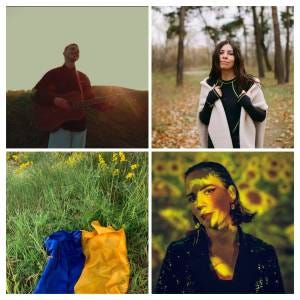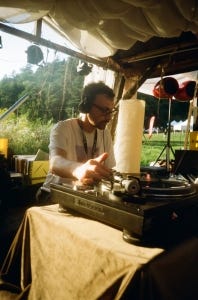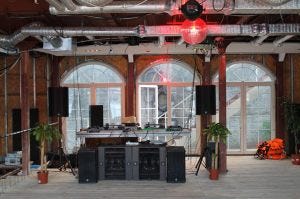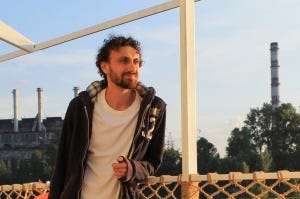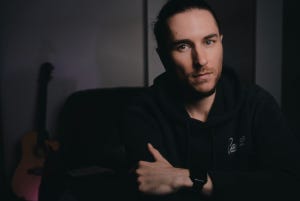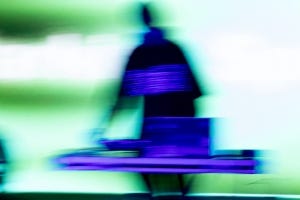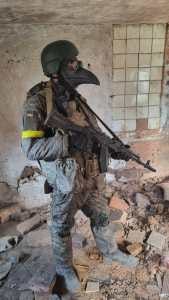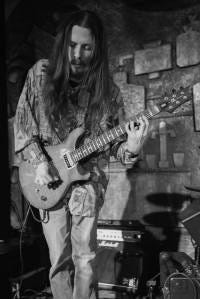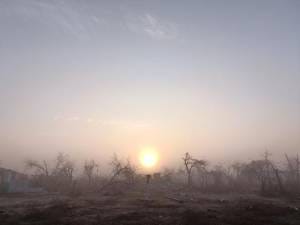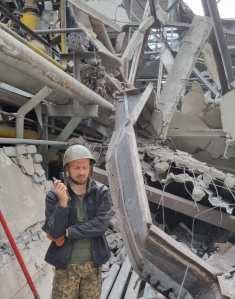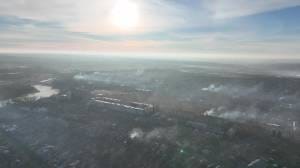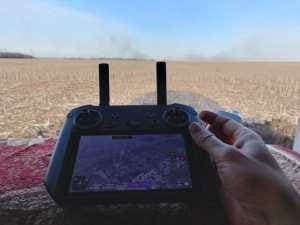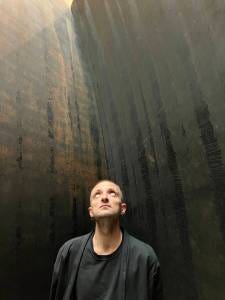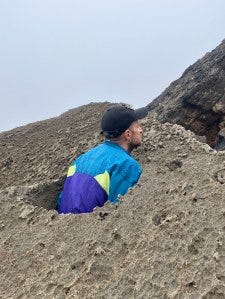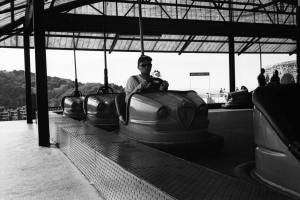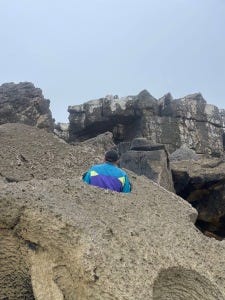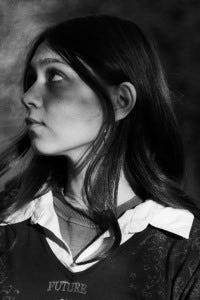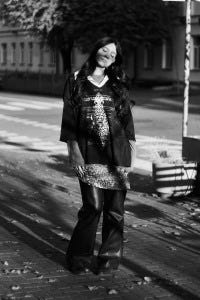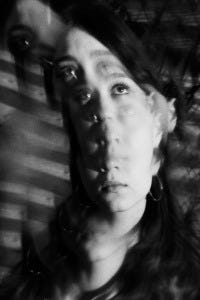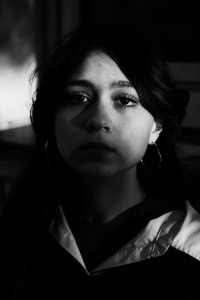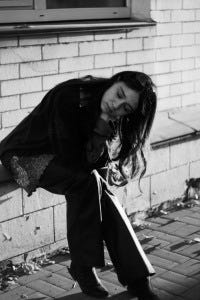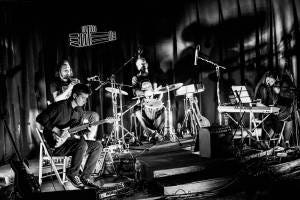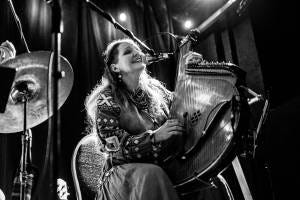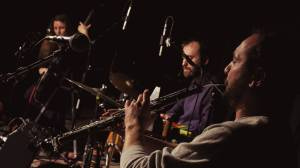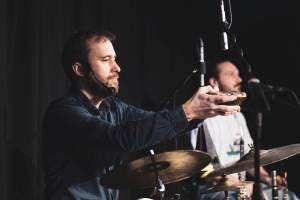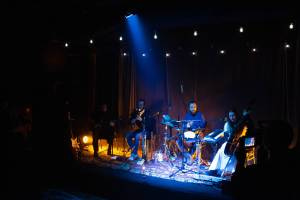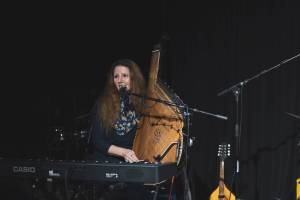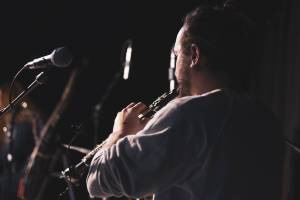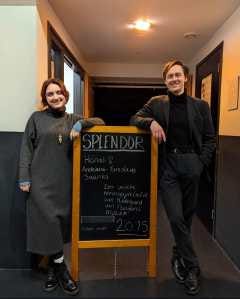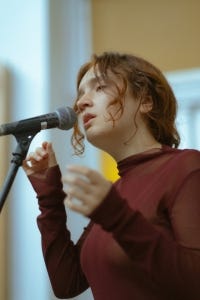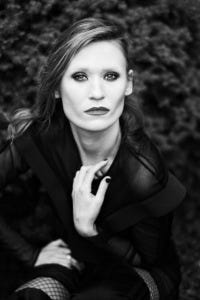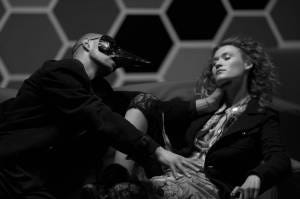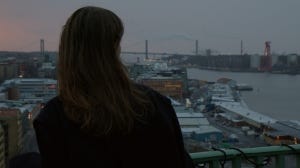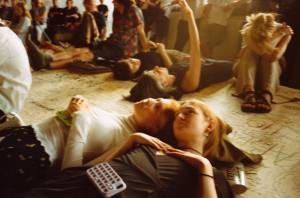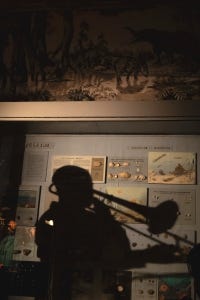Ukrainian Field Notes XLI
February 24 marks the third anniversary of the full-scale invasion. As I write this, negotiations are taking place without the direct involvement of Ukraine, or Europe for that matter, which is the very reason I started this series, to give back agency to the Ukrainians.
As Uilleam Blacker underlines in Your Homes, Our Maps, "land is being treated as an abstract geopolitical resource, borders as a convenient and flexible instrument of foreign policy, while the actual people living in the land and on either side of shifting borders mean nothing."
"Plus ça change," as they say.
And so it is that this month we travel from Kharkiv to Lviv and from Kyiv to Dnipro, taking in Crimea along the way, to hear the sounds and listen to the voices of those who bear witness, those left behind, the displaced and those carrying the keys of homes valued as simple real estate they might be forced to relinquish to appease the colonial ambitions of the powers that be.
To open proceedings, we talk paperwork with Rustam, we use pine needles to wake the owls with Хвоя будить сов, we close our eyes to the sound of Olexandr Ignatov's piano, we share Kurb Loris' feline love, and we hear about Parking Spot's fear of silence.
Meanwhile, equii follows William Basinski's recommendation to "reeleeaase your aart," birdsandpeople picks up his guitalele in the midst of explosion on the frontline, and Ryndin samples The Prodigy, just as DJ Superlite pays tribute to a fallen friend, Insomnia Taxxi looks at statues, and ЛІЗА ПАДЛІЗА plays the balalaika with her cat.
At the same time, Yaroglory celebrates the diversity of borsch, Shee Ma is deeply moved by the writings of Victoria Amelina, Thry ktoky v nich abandon the unnecessary and empty, and Weaverbird tries to move into the black metal field without leaving discernable traces.
And finally, Andriana-Yaroslava Saienko laments the trend of incorporating folk motifs into pop songs, RinniR argues that self-destruction makes sense in a complete family, Max Serzhenko looks for coping mechanisms, Obeth ends up with thousands of loops, while Sasha Andrusyk indicates out how the Ukrainian vernacular is now sunken in grief.
A bountiful crop of new releases follows with many familiar names including orfin, an honest fox, Myroslav Trofymuk, Phite Noise, Foa Hoka, L’Arc de Langeron, Del Cano, LIGHT WAY, ОЧІ, Обрій (Obrij), SVZZ, Arthur Kriulyn, hjumən, Zlele, Yes Stanley, Trinidad Shevron, Roman Khropko, Andriy Sirotkin (Shade of Drums), Brainhack Musicbox, Alexander Stratonov, and featured for the first time, Rybolov, Světъ, Terawax, Garden Xub, Grid User, Intergalactic Noize Commander, Sun-Inside, Natasha Luchko, Öskar and Pizza Kyrpydyra, Медовий Полин [Medovyy Polyn] and Vallen.
We also showcase two mixes by Lostlojic and Vvanya Samokrutkin and two podcasts from Ukraine World and Спільне. In our Viewing Room we host the documentary film West of East about the city of Kramatorsk and the execution of 16 year old Stepan Chubenko with a soundtrack by Alexander Stratonov. We are then treated to a bucolic escapade from orfin's latest, while Waveskania presents a reflection on her production process. Plus a couple of live sets from Undo Despot and NFNR from the celebrated Noise Every Wednesday sessions in Kyiv, and a live clip from the Yevhen Puhachov Quartet.
But before we unleash the 30,000+ words we collected over the course of the past month (ACL's longest article to date), we give you our monthly podcast for Resonance FM with Yulia Shcherbak, Aspen Grove and Tetiana Khoroshun in an episode focused on Crimea, and dealing with severed ties, longing and the impossibility of returning home.
Tracklist
Tetiana Khoroshun - "I see the sea"
Aspen Grove - "Glybyna"
Tetiana Khoroshun - "Crimean Titan"
Aspen Grove - "Ne Zabuwai mene"
Tetiana Khoroshun - "Yalta"
Aspen Grove - "Druzhe"
JANUARY 26, 2025 - KYIV
My name is Rustam, and I’m a DJ. I also experiment with music production, primarily in various forms of house music. Back in the 1990s, I played in an extreme metal band, but in 1995, I discovered The Young Gods’ Only Heaven LP, which shifted my attention to electronic music. In the 2000s, I got into the wave of future jazz and deep house, started DJing in clubs, and organizing parties. In the mid-2000s, I hosted a radio show dedicated to jazz-adjacent electronic music. I also organized after-hours events at one of Kyiv’s oldest techno clubs, Cinema, with my friend and talented musician, Brother G.
Later, I moved to Odesa for a few years because I found my dream disco spot by the sea—Agarti—and continued throwing parties there. Afterward, I opened a vinyl store for DJs and built connections with Odesa’s top club, Port. In Odesa, Olexander Voznichenko (IO Mulen) introduced me to Silat Beksi. We became friends, and he helped me develop my skills as a music producer, leading to the release of my own tracks.
When I returned to Kyiv, I co-founded a floating platform club with a friend and my wife, but the project was shut down due to misunderstandings with the dock’s owner. Afterward, I worked at a vinyl record store for several years. I teach at Closer Connections and collect materials about Ukrainian DJ culture.
Has the full-scale invasion changed the way you think about music and sound in general, and has it had an impact on your playlist?
Yes, absolutely. I’m now very mindful of ensuring there are no sounds of sirens, gunfire, or explosions in the tracks I play.
What can you tell us about the production process for Cancel or Save, and do you often find yourself in a Cancel or Save situation?
I received a Korg M1 synthesizer from my friend and talented musician, Max Chorny, who literally brought it to my home. It adds a retro feel to my music, while Deepmind synth gives it a futuristic touch. "Down On The Street" was something I made back in 2016 in Odesa but struggled to finalize; even now, it sounds amateurish and unpolished, but it’s out there. "Joysteak" started as a slightly cheesy deep house track but transitioned into fun jazz improvisation.
What have you learned from running the club Debarkader?
I learned how to work with my hands and juggle multiple roles—being a boss and a cleaner, a bartender and a builder, a DJ and a mover, an electrician, and even a social media manager. I also had to familiarize myself with licenses and other paperwork.
How would you say three years of curfew have affected the clubbing scene? And how has the curfew affected you on a personal level?
Despite its enormous challenges, the Ukrainian clubbing scene is more vibrant than ever. Every party feels like it might be the last. I sometimes can’t believe my eyes when I see such diversity during these difficult times. Alongside Kyiv’s nightlife giants like Closer and ∄ (K41), new spaces like ABO and Brukxt are hosting incredible parties, and in frontline Kharkiv, a club called Some People has opened. New record stores are also emerging. For example, on Fridays, people often have just a couple of hours after work to get to a party and make it back home in time for curfew. Taxi fares after 11 p.m. skyrocket exponentially.
Personally, I miss the ability to stroll around the city at night, but that’s a small price to pay. Many of my compatriots are losing their lives in the war or under daily drone and missile attacks.
Many Ukrainian artists have told me that in the first few months of the full-scale invasion they were unable to play music, let alone compose or perform new music. Do you share this experience and if so, what were you listening to, once you went back to music?
In the first days of the full-scale invasion, we stayed in the Bucha district at a friend’s house. By February 27, Bucha was occupied. russian troops were just a few kilometers away, and there were ongoing battles, gunfire, and constant explosions. During those days, I received an email confirming that a track I had made back in 2017 would finally be released on vinyl. I also got an invitation to perform in Switzerland that summer with the band DakhaBrakha. These moments gave me hope.
When we managed to escape to a semi-surrounded Kyiv on March 8, I felt relief, though the city felt surreal. Guns were being distributed in the streets, people were manning checkpoints in freezing weather, stores were closed, and the few open ones had long lines with shelves holding only millet and jamón (the cheapest and most expensive items). On the same day, I got an offer from 20ft Radio to record a calming mix for a charity fundraiser for victims of the war. I completed it within a day.
Which book / film / album / song / traditional dish / podcast / blog / artwork / building / meme best captures Ukraine for you?
First, it’s important to note that choosing one thing to represent Ukraine is always subjective. Ukraine is multifaceted, and everyone has their own experiences and associations. However, if I were to pick one cultural symbol, it would be Kobzar by Taras Shevchenko. His poetry is deeply emotional, sometimes painfully raw, yet always filled with hope. These are the same emotions Ukrainians have repeatedly experienced throughout their complex history. While Kobzar reflects the 19th-century experience, its themes—longing for one’s homeland, fighting against injustice, and the sincere desire for freedom—are still deeply relevant to modern Ukraine.
[bandcamp width=100% height=120 album=1394554968 size=large bgcol=ffffff linkcol=0687f5 tracklist=false artwork=small track=3169716209]
JANUARY 30 - 2025 - BROVARY
Хвоя будить сов [Khvoya budytʹ sov – Pine Needles Wake Up the Owls]
Hello. I can tell you a lot about myself))
I was born in the Luhansk region, in a small mining town with its strict street laws, where I became interested in music at the age of six. In the mid-90s, the influence of russian music on provincial towns was crazy, and I have an older brother who listened to russian rock. I won’t name names, but I will say that even at the age of six I was listening to rock music, which contained elements of techno and rave, which later influenced my musical taste. Since then, I have listened to a lot of different music. Moreover, it cannot be said that everyone liked the same style of music, everything was, and is, very individual. I remember, while studying in college, there was a period of thrash metal. Rappers I knew were very surprised when, looking like a metalhead, I replied, “Yes! I agree 100%” when they called the russian metal band Aria shit.))
My slow-paced life changed in 2014, when the russian army entered Luhansk. Together with my wife and ferret, we moved to Brovary, Kyiv region, to start a new life because freedom is more valuable than any temporary disruption. Since then, we have been living here with my wife and daughter Vladislava, to whom several of my songs as “Pine Needles” are dedicated.
I never seriously studied music; before the army, I was in a punk band (one single performance at an international folk festival), several performances on the college stage (I played Mozart on an acoustic guitar), and in the noughties I tried to study music together with friends (dark ambient). Pine Needles Wake Up the Owls is my first solo project.
By and large, my musical tastes are: 70s punk, 80s post-punk, 90s rave, 00s black metal, 10s neofolk, but of course there are exceptions.
You released five albums since you joined the army in 2022. Can you tell us about your production process with tracks often recorded from the first take?
My works are primarily therapeutic in nature. They provide an outlet for sadness and depression arising from the stressful conditions of military service. The sound quality and melodies are not sophisticated or academic in style, this is not an important criterion for my work. What is important for me is the DIY principle in action)
I have no musical education and do not try to do things “the right way”. With my project "Pine Needles" the main thing is the message, or the meaning, concept and atmosphere. Each album hides a lot of hidden links that will not be clear to a casual listener. For example: in the track "II" from the album Щоденник янгола [Shchodennyk yanhola - Diary of an Angel], the dissonance created by the music and a kind of industrial clang (as if someone is sharpening a saw), is a reference to Gustav Meyrink's "The Angel of the West Window," in which Bartlet Green swings on the chains that bind him in a dungeon. The song from the track is Green's singing, the clanking is the sound of the chains, the music is the overlay of another reality from which the reader (listener) contemplates the events in that dungeon.
All the works were recorded on a cheap laptop with Mixcraft Pro Studio, the entire vocals were recorded a smartphone's dictaphone. Every sound is a keystroke, even percussion. Therefore, they are not always accurate. Since it is very rare to be alone in the army, the music was written with headphones on amongst the chatter of people sitting nearby, mostly at night. The biggest problem is to record the voice in such a way that other people or any other noise are not audible. When I recorded the vocals for Нічні марення [Nichni marennya - Nocturnal Delusions] for instance, one can hear a fan heater in the background)))
Your work is full of literary influences, including not only Ukrainian poets such as Volodymyr Svidzinsky and Bohdan-Ihor Antonych, but also writers from Thomas Mann to Walt Whitman and from Gustav Meyrink to Aleister Crowley. How do you select texts and how do they resonate with you in the current circumstances?
I have always loved reading, and during the war I began to read much more and have already formed my own small library of 360 books. I always write out interesting saying and texts into separate text files according to their subject matter. I have several such files open on different topics at the same time. When I have collected enough material, I start working on an album.
Firstly, I try to concentrate on recording the voice, and only then I work on the music. It is interesting to "play beads" with music, imagining how Thomas Mann or Hermann Hesse might listen to the music of "Pine Needles" based on their poems or, conversely, to superimpose their poems on the music of other performers.
I do not consider myself a musician, for this, one needs to master quality to a higher degree and work harder. In my case, there are certain harmonies and concepts that come to me and that I want to put onto a musical canvas and just listen to in a circle of friends and acquaintances)))
Pine Needles Wake Up the Owls is, first and foremost, a mood, a night guest that will take the listener into the world of dreams, tell a fairy tale and provide an informative guide to the works of talented masters.
As an aside, do you and Drudkh share an interest in paganism?
Do I share an interest in paganism? Today, this term is very much speculated on, so one needs to be extremely careful)) I do not jump over the fire, do not lead round dances and do not celebrate the solstice. However, I really like to be in the forest or in a field, to feel the trees and to hear the wind singing, the swaying of grass, or the crunch of snow.
My worldview is not something canonical. I like to read about the first Christians, Gnosticism, Siddhartha, the works of Crowley and LaVey... Let's just say that if any faith carries something wise and useful without interfering with other people’s beliefs, I will be happy to be interested in this faith. But I have yet to meet a book or religion that I agree with 100% (except for my own poems, hehe)))
As a Luhansk resident, did you come from a Russian-speaking or Ukrainian-speaking family? I ask because many in the “west” still believe that “speaking Russian” means identifying as Russian, not as Ukrainian.
Until mid-2022, I spoke russian in everyday life and at work. And, it seems to me, that only now I am starting not only to speak, but also to think in Ukrainian. I never understood the “language” problem. Believe me, not only in the “west”, but also in the “east” people pay too much attention to this issue. I always knew and respected the Ukrainian language, and when necessary, I communicated in Ukrainian.
I remember the total “language” paranoia in Luhansk after the Maidan events. People really believed that they would be forced to switch to Ukrainian in everyday communication, and this scared them a lot. To my questions – “How can they force you to speak a language you don’t know in everyday life?” no one could answer. The means of russian propaganda were active.
Already in the army I came across worthy, honest and valiant russian-speaking people, whom I can emulate. And I am also familiar with dishonest Ukrainian-speaking people-parasites. Conclusion: language is not a criterion for the quality of a person. The first and second albums of “Pine Needles” are in russian Голос поймы [Golos poymy - Voice of the Floodplain 2021], and Хвоя будит сов [Khvoya budit sov - Pine Needles Wake Up the Owls, 2022]. I often listen to them and love them no less than the others. I myself switched to Ukrainian for two reasons: I want our children to speak Ukrainian (children take an example from the military), there is an opportunity to develop my language skills, being in a predominantly Ukrainian-speaking environment.
What do you think about the inclusion of war sounds and air raid sirens in many tracks by electronic music producers and do you ever consider them useful or necessary for conveying the experience of war to an international audience?
Actually, the only example that springs to mind is Gates of Europe by ROME. If we take war in general, then I listen to a lot of martial arts, where the sounds of war are basic. The music of MZ.412 or TRIARII is pure war!
Of course, the sound of an air raid siren or the crackle of a machine gun cannot convey the experience of war. War has a traumatic impact on any person, on their brains, bodies and souls, but on every scorched land, a green sprout will someday break through.
In your regiment, you probably all listen to very different music, but are there times when you share certain tracks or musical genres, for example, to remember the fallen soldiers?
There are not so many people in this environment who share at least some of my musical tastes. But the value of common interests is a hundred times more important. For example, at the suggestion of my friend Oleksandr, who took part in the latest work of "Pine Needles", I discovered some of the works by Nick Cave & The Bad Seeds.
As for the fallen, I cannot say that we in the unit listen to anything together with anyone. Rather, grieving is such a personal process that in such moments we all play our own songs in our heads.
The lyrics from "...Упала ніч” [Upala Nich - Night Has Fallen] from the album Нічні марення [Nichni marennya - Nocturnal Delusions] convey something of this experience in the aftermath of the explosion of two S-300 missiles: "The night has fallen, people are already running around to help, to save the club. And in the club, there is death, bodies lie in a circle... The night has fallen, so that the trident may rise again".
I was very surprised when I found out that there was a musician in my brigade who wrote electronic music. It turned out to be John Object, whose music may not be to my taste, but which I respect. Unfortunately, I only had the opportunity to talk to John once, but this conversation was very interesting and important for me.
How was your conversation important for you?
I had seen him around, but only after I read a news post on Neformat about a soldier who writes electronic music, I exclaimed something like, “Oh, that’s the guy!” But our meeting took place much later, somewhere six months later around midnight in the autumn forest of the Zaporizhzhia region. It was very interesting to communicate with a musician and he’s such a nice person as well. This case vividly illustrates the miracles that happen in our lives: you see people next to you, but you have no idea how productive and exciting any conversations with such people can be. Such cases give you the strength not to abandon creativity and simply feed you with positive energy.
Has your playlist or listening habits changed since you joined the army, and what role do you think music plays for you in the current circumstances?
Yes, before 2022, there was a lot of russian underground music on my player. This especially applied to neofolk, industrial and noise. I had no idea that such a scene existed in Ukraine because everything I heard up until then had a taste of either “pop” (Onuka), or an accordion-joking song (Воплі Відоплясова [Vopli Vidopliassova], Truart) or simply did not suit my taste (ВІЙ [Viy]). And it was during the war that I heard and liked Kadaitcha and Casa Ukrania, whose members also responded to the invitation to take part in the latest work of “Pine Needles”. And how many more discoveries of interesting Ukrainian projects lie ahead, one can only guess.
But Ukrainian black metal has been in my heart since I was about 15 years old. Several visits to Nokturnal Mortum concerts in Luhansk had a great influence on me. The influence of music on me during the war did not become greater (because it couldn’t get any bigger))), but the discoveries increased. Currently, on my player, in addition to the above-mentioned bands, you can find the following Ukrainian performers: Кому вниз [Komu Vnyz], Сокира Перуна [Sokyra Peruna], Ivanov Down, ЧУР [CHUR], Лютоми́сл [Lutomysl], White Ward, Svrum, Dub Buk (Burshtyn), Drudkh, ДК Енергетик [DK Energetyk] and projects by Саша Буль [Sasha Boole], sometimes I listen to the Luhansk hardcore punks 2KF).
What book / movie / album / song / traditional dish / podcast / blog / work of art / building / meme best represents Ukraine for you?
Book – trilogy “Chronicle of the Grey Order” by the contemporary writer Pavlo Derevyanko and poems by Oleh Olzhych
Film – hard to answer, I haven’t watched much Ukrainian cinema, I would be glad if readers share their preferences in the comments
Album – Drudkh - Лебединий Шлях [Lebedynyy Shlyakh - The Swan Road], Nokturnal Mortum – Істина [Istina - Truth], CHUR - Лихо [Lyho]
Song – previously DUB BUK - “Glory to Ukraine!”, now Sokyra Peruna - “Heavenly Battalion”
Traditional dish – borsch from the wife with donuts)
Podcast – Kult Podcast, Cult-Vitaliy-Stetsenko, Akustyka Tinej
Blog – Прийде й забере [Pryide i Zabere]
Work of art – magic stones, once laid out by someone somewhere in the Luhansk region steppe (in the photo)
Building – Ukrainian Drama Theater in Luhansk (nothing original in its architecture, but a very symbolic place)
Meme – "немає сечі терпіти ці пекельні борошна" [nemaye sechi terpity tsi pekelʹni boroshna] (I don’t know how to translate this into English))).
Finally, do people in your unit know your music, and if so, how do they react to it?
I respect the taste of those in my unit, so if I see that a person is not interested in music, I will not impose my work on them. And vice versa, if a person listens to psychedelic, gothic rock, ambient or neofolk, I will suggest my music to them. Those brothers who listen to King Crimson, The Cure or Pink Floyd know about the existence of "Pine Needles" and the latest album received a mostly positive response.
I would like to thank the readers and authors of the blog for their attention to the project and wish you discoveries of interesting music and that war never enters your home.
[bandcamp width=100% height=120 album=179890784 size=large bgcol=ffffff linkcol=2ebd35 tracklist=false artwork=small track=35092336]
JANUARY 31, 2025 - LVIV
[caption id="attachment_153621" align="alignright" width="225"]
photo by Olexandr Ignatov[/caption]
I’m a composer, producer, and piano player from Lviv, Ukraine. I started making music in school after I began taking piano lessons, but honestly, even before that, I was already playing around with a keyboard my parents bought me. I didn’t have any formal education back then, just trying things out, experimenting, and making sounds! I also started with acoustic guitar first but later gravitated more towards keyboards and piano.
Has the full-scale invasion changed the way you think about music and sound in general, and has it had an impact on your playlists?
That’s a great question. I don’t think it really changed much how I think about music and sound in general, but I’ve definitely noticed its impact on the music I composed during that period and on the music of other artists as well. You know, the war really does influence how you live your daily life, how you think and feel, and inevitably, how you compose.
You’d think people might listen to less music during times like this, but it’s actually the opposite. I’ve seen a big surge in new music and people seeking music that makes them feel safer or helps them get through tough moments. Music has become a powerful tool for comfort and connection during these times.
[caption id="attachment_153622" align="alignleft" width="214"]
photo by Serhii Matviichuk[/caption]
What can you tell us about the production process for your latest album Just Close Your Eyes? Also, I am curious about the artwork. Was it generated with AI?
It all started one day when I was sitting at my piano, experimenting with little bits and pieces, recording them, and sharing some of them on Instagram. It was about at the same time I finished working on my previous album Motherland. I noticed that people really started resonating with what I was sharing. I was essentially playing melodies I loved from other artists and coming up with my ideas, just putting everything out there for everyone to hear.
Over time, my audience grew, and I found myself with quite a collection of these musical ideas. I saved them all, picked the best ones, and started finishing them—often with input from my Instagram followers. Back then, I had about 5,000 followers (it’s grown a lot since), and I would ask them for feedback on what they felt when listening to the pieces and even for title suggestions. That interaction helped me understand the essence of each idea, and eventually, I shaped them into a cohesive album. This album tells the story of this beautiful collaboration with my audience over the span of two years. I’m so grateful for each and every person on that platform, it’s an absolute pleasure to have this community who truly celebrates the beauty of piano and music.
And as for the artwork—no, it was definitely not created with AI. I worked closely with a talented designer, Vladimir Hadzic, from Serbia. He has a very unique style that perfectly matched the ideas I had for the cover. I think he did a fantastic job—it’s honestly my favorite album cover now. You can get lost in it, trying to dissect all the little pieces and puzzles, which are also conceptually connected to the tracks on the album.
[caption id="attachment_153623" align="alignright" width="232"]
photo by Serhii Matviichuk[/caption]
Many Ukrainian artists have told me that in the first few months of the full-scale invasion they were unable to play music, let alone compose or perform new music. Do you share this experience, and if so, what were you listening to when you returned to music?
I didn’t struggle as much with playing music because of the war itself, but something personal happened that impacted me deeply—I lost my mom in the first days of the war. A few months later, I also lost my grandma. It was such a dark and rough time for me, filled with grief and sadness. For a while, I felt completely unable to play music.
Eventually, when I managed to return to it, music became a therapeutic outlet for me. Slowly but surely, I started creating and releasing music again. I just can not do it, you know. During that time, I wasn’t listening to much else—mostly my own music. Occasionally, I’d check out new releases from artists I like, but that was about it.
Would you say that since the full-scale invasion, the role of music in Ukraine has shifted from one of entertainment to encompass the expression of identity, communication, and emotional and physical survival?
There was definitely a shift. After the first months of shock, you could feel how artists continued doing what they were meant to do, but it just wasn’t the same. Sometimes it even went to extremes—there was a wave of overly patriotic music, which isn’t really my thing, but it had it’s place and time.
But music played a vital role in boosting morale, helping people stay sane and not lose hope. Humor, music, and other forms of creativity all helped push through the roughest moments. That’s embedded in Ukrainians - they would make fun and joke of anything, even the scariest stuff - humour is our second nature. Tons of memes were born out of it. And music became more than just entertainment—it became a lifeline. Even now, it’s a mix of emotions. One moment, you’re faced with heartbreaking news, and the next, you’re trying to move forward, create, and consume art. It’s a strange, conflicting experience where you’re sometimes not sure if it’s even okay to feel joy or be entertained. It’s very surreal.
Do you believe in the healing power of music under present circumstances?
Absolutely. I believe in the healing power of music under any circumstances, especially during tough times like these. There’s nothing like good music—it can help you overcome and live through any emotional state. During times like this, when emotions are constantly changing, music helps you stay grounded and connected.
[caption id="attachment_153625" align="alignleft" width="270"]
photo by Olexandr Ignatov[/caption]
Would you say that the full-scale invasion has increased the standing of Ukrainian artists on the international stage, or is Ukrainian music still underrepresented?
You can definitely tell there’s been an increase in awareness of Ukrainian music and artists. Most Ukrainian artists, though, focus on the domestic market, and only a few aim for international audiences. Of course, Ukraine’s Eurovision win in 2022 with Kalush Orchestra’s “Stefania” brought global attention, but those moments are rare and often temporary.
That said, the internet has made a huge difference. I’ve seen a lot of international interest in Ukrainian music, with reaction videos and other content popping up online. So yes, there’s been progress, and that’s a really good thing.
Which book/film/album/song/traditional dish/podcast/blog/artwork/building/meme best captures Ukraine for you?
• Book: Kobzar
• Film: Я, «Побєда» і Берлін [Rocky Road to Berlin]
• Album: Okean Elzy – Модель [Model]
• Song: Volodymyr Ivasiuk - "Пісня буде поміж нас" [Pisnia Bude Pomizh Nas]
• Dish: Яворівський пиріг [Yavorivskyi Pie]
• Building: There are so many—each reflects Ukraine’s rich and diverse architectural influences.
• Meme: Stepan the cat.
[bandcamp width=100% height=120 album=3892484048 size=large bgcol=ffffff linkcol=0687f5 tracklist=false artwork=small track=3432068916]
FEBRUARY 3, 2025 – KHARKIV
[caption id="attachment_153661" align="alignright" width="259"]
photo by @wutio2[/caption]
My name is Petro Zorkin, but I release music under the names Kurb Loris and Dirtbag Loris. I’m 15 years old, born on May 31, 2009, in Kharkiv, Ukraine. Largely thanks to the support of my parents, who recognized my passion to music and nurtured it. When I was five, they bought me a synthesizer, which became my first instrument. A year later, I entered music school, where I began to study piano and develop my understanding of music. For several years, I focused on playing the synthesizer and piano, but my dream to create my own music never faded.
In 2022, when the full-scale invasion of Ukraine began, my family and I had to leave Kharkiv and temporarily relocate to a village in the Sumy region. This period was challenging, but it also gave me time to reflect and explore new directions. While I continued playing the synthesizer, I also picked up an acoustic guitar and started teaching myself basic chords. By the time I graduated from music school in 2023, I could already play some songs by Alex G. That same year, on my birthday, my parents gifted me an Eko S-350 Stratocaster and an old small Hiwatt amp. This moment was a turning point — I finally had the tools to experiment with electric guitar sounds. I began recording my first tracks using just my phone and the BandLab app, occasionally sharing them under the name Dotkape or The Sunder on SoundCloud and Telegram channels for my friends.
The music I made during this time was very raw, but I really blending slowcore elements with indie folk influences. Later that year, I returned to Kharkiv, and the stress of being back in the city took a toll on my energy, so for a while, I stopped making music altogether and I worked as a graphic designer in a studio. In 2024 I returned to recording, but now in a more serious way, using my laptop for mixing. I started to release my music to Bandcamp and SoundCloud under the names Kurb Loris and Dirtbag Loris.
Has the full-scale invasion changed the way you think about music and sound in general, and has it had an impact on your setup and playlist?
Not really. I always used to listen to music mainly for atmosphere and setting a certain mood, but now it has also become a way to process reality. These days, I gravitate towards more chaotic, aggressive, and experimental music than before. Harsh noise, death industrial, drone — anything that feels unstable and unpredictable. My approach to making music has changed as well. Now I care more about texture and emotional impact. I try to experiment with pedals, reverb, distortion. The music has become less predictable, but that’s what makes it meaningful.
My playlist has also shifted — I listen to more Ukrainian artists now, both as a conscious choice to support the scene and because their music carries new meaning in this context. At the same time, I’ve come to appreciate silence, pauses, and minimalism. Even random everyday sounds seem to hold more weight than they did before. But maybe these changes are not related to the war, but simply to growing up.
[caption id="attachment_153664" align="alignleft" width="199"]
photo by @wutio2[/caption]
If I am not mistaken, you started releasing music in 2024. What exactly kickstarted your artistic practice?
My decision to pursue music seriously in 2024 was driven by a couple of key factors. First, I was experiencing a lot of strong emotions related to both global events and personal experiences, problems with socialisation and with my parents, and I needed a healthy outlet for those feelings. Music became that outlet, a way for me to process what I was going through.
Second, the shift to online learning and a lack of social interaction left me with more free time. And honestly, I was bored. But instead of letting that boredom be unproductive, I channeled it into creative pursuits, specifically music. I finally had the time to dedicate to it properly. My life is changing very quickly and with every change I need to make more music, as music is the best way for me to talk about these changes express my feelings.
Also I found my way back to recording because the studio I worked in closed, so this time I taking my music to the next level, with a more serious approach. I started using my laptop for mixing, though I still recorded many parts on my phone. I adopted the names Kurb Loris and Dirtbag Loris and began publishing tracks more often. I also became deeply inspired by indie folk artists like The Microphones and Sun Kil Moon, as well as shoegaze pioneers like My Bloody Valentine and Lovesliescrushing. Their ability to create immersive, textured drones pushed me to experiment more with my own sound. I started searching for a unique style, working within the limitations of my setup but trying to make the most of what I had.
At the beginning of my journey, I started by covering songs from The Loner(s), a lo-fi indie folk project by James Keegan. However, it wasn’t long before I felt the need to create something of my own. Eventually, I put together my first serious EP, Quiet. The project was primarily indie folk, but the final track stood out as something new for me — an experimental piece with heavy shoegaze influence. I found myself really enjoying that direction, so a month later, I released my first full-length album, Now I Plant My Own. This record leaned more into shoegazy-ambient textures while still incorporating folk elements. Thematically, it was about the loss of something deeply important — in my case, the peaceful life I once knew and the friends who were scattered due to the war.
A month after that, I pushed myself further into experimentation with another album, Panacea Aches. This time, I returned to the noisy ambient sounds I had started with, but in a much more refined and intentional way. The album explored the emotions I experienced during the first days of the war and the period leading up to my return home. It was a deeply personal record, capturing the uncertainty, fear, and eventual resignation that defined that time for me. Following that, I released yet another full-length album, People I Can’t Trust Now. Like its predecessor, it was heavily rooted in ambient music, but by this point, I felt like I had found a creative path I truly wanted to explore.
Balancing between indie folk and ambient, I continued experimenting and refining my sound. This led to the release of two mini-albums. The first, Quiet II, served as a continuation of my earlier EP, expanding on its themes. The second, Comfort (Demo EP), was recorded entirely through my laptop’s built-in microphone. I wanted to capture a raw, unfiltered sound, almost as if the album had been recorded on cassette tapes. This lo-fi aesthetic added a sense of intimacy and nostalgia, reinforcing the emotional weight of the music.
Each of my albums represents a different state of mind — a snapshot of where I was emotionally at the time of its creation. At its core, my music is an attempt to translate feelings into sound, to express emotions that are sometimes difficult to put into words. Every track is a reflection of my experiences, thoughts, and the world around me.
I hope that listeners will find something meaningful in my songs, a new perspective, or just a brief moment of connection. Now I released an ambient shoegaze album called What Would Change? that is very important for me. I worked on it a lot and I put so many emotions in it.
[caption id="attachment_153671" align="alignright" width="222"]
Improvisations (04.11 - 05.11)[/caption]
Can you describe your production process? Also, you have been very prolific and I suspect that there are many more tracks that are still on your hard drive. At what point do you consider a track to be finished?
My music creation process is very spontaneous. Usually, when I feel down, at night, I sit down at my laptop, plug in my amp, guitar, and effects pedals, and start recording into my phone microphone whatever melody or rhythm gets stuck in my head. I transfer what I've recorded to my laptop, open the browser version of Bandlab, and then experiment with various effects and sounds until I achieve the result I want. I used to use cassette noise to create a lo-fi atmosphere, as if the music was actually recorded on a cassette recorder, but now I'm trying to move away from that idea.
Sometimes I record directly into my laptop microphone. For example, the mini-album Comfort (Demo EP) was recorded on my laptop using an electric guitar, synthesizer, and acoustic guitar. I also have a lot of unreleased material and countless ideas, but I usually create each album very quickly — often within a month. However, I always strive for perfection, so unfinished albums tend to end up sitting at the bottom of my Bandcamp drafts, waiting for the right moment to be completed.
As for the completion of a track or an album, it's a very subjective question. I can work on one track for a couple of hours, or sometimes even a few weeks. It's important for me that the track evokes certain emotions and conveys what I want to say. When I feel that the track fully expresses my idea, I consider it finished.
You are back in Kharkiv now. How do you cope with the constant air raid sirens, and do you feel connected in any way to the music scene there?
Yes, I live in Kharkiv, and in fact, like in many other Ukrainian cities, everyone has gotten used to air raid sirens. But when there's a real threat to the city or specific areas, you have to go to the corridor or the metro, just in case you're outside. Of course, everyone is scared for themselves, for their loved ones, for their home, but nobody really wants to leave, because Kharkiv is a great city to live in. It's very beautiful, everything works, and people are mostly kind and strong-spirited.
As for the Kharkiv music scene, I don't know, because I don't interact with anyone from there, and I'm not sure if I'll find anyone who makes the kind of music I really like. So, my plan is to get to know people from the all-Ukrainian scene, because there are a lot of cool bands and performers there who deserve more respect and attention from the audience. I really love current Ukrainian shoegaze scene and bands like Delayed Minds, Plaaaato, Rippedd. Hope I'll perform with them on the same stage.
In your album Panacea Aches there are two tracks titled “War Soundtrack I” and “War Soundtrack II”. What is your position on the use of air raid sirens and other war sound in experimental and electronic music tracks?
The entire album Panacea Aches is deeply connected to the war. For me, incorporating war sounds into music is a way of documenting our reality — it’s like creating a sound chronicle of what’s happening around us. These sounds are not just samples, they are real, visceral fragments of daily life that many of us have experienced firsthand. I don’t romanticize war, instead, I believe that art, especially music, can serve as both a form of testimony and a means of processing collective trauma. By integrating them into my work, I want to capture the unsettling contrast between the ordinary and the horrific.
[caption id="attachment_153662" align="alignright" width="230"]
Live from my room (29.12.2024)[/caption]
You use cat pics on the cover of a number of your releases. Is that because you feel an affinity with them in terms of character, or you just like cats?
I’ve always loved cats. They’re independent, free-spirited, and a bit unpredictable, which is something I relate to a lot. At the same time, cats are symbols of comfort and home, and during difficult times, that sense of familiarity and warmth becomes even more important. In March 2022, I managed to escape to a village in the Sumy region, there were a lot of cats — around nine, if I remember correctly. Their presence made a huge difference for me during the first, most uncertain months of the war. They gave me a sense of stability when everything else felt chaotic. Just having them around, watching their routines, and hearing them purr brought moments of peace.
I ended up staying in that village for about a year and a half. It was a quiet place, and I didn’t really manage to make many friends there, which made my bond with the cats even stronger. In a way, they became my companions when I felt isolated. They reminded me that even in the most challenging situations, there’s still room for small moments of connection and warmth.
Many artists have told me that they found it difficult to listen to music in the immediate aftermath of the full-scale invasion let alone produce new material. Has this been your experience as well and, if so, what genre of music did you listen to once you went back to music?
In the first months of the war, it was incredibly difficult to listen to music. It felt like no melody, no song, could coexist with the sounds of what was happening around me. But over time, I slowly started returning to it, as a source of comfort, stability. The music of Duster played a huge role in this. Their album Contemporary Movement became something I clung to — I must have listened to it hundreds of times, on repeat, obsessively. It was with me during my studies, throughout the day, and even in my dreams. There was something about its atmosphere, that resonated with everything I was feeling at the time.
Alongside Duster, I found solace in the music of Starry Cat, Teen Suicide, and Julia Brown — all projects by Sam Ray, one of my favorite musicians of all time. His music has this fragile, lo-fi sound that made it feel deeply personal, almost like a conversation with a friend. Those songs helped me process everything in a way that words couldn’t.
You are 15 years old, which means Russia has been waging war against Ukraine for most of your life. Has this made you immune to Russian music and culture in general, or did you inherit some of that from the older generations?
Growing up, I was fortunate to be deeply immersed in Ukrainian culture. Thanks to my parents too. Because of this, it has been easier for me to distance myself from russian culture, especially now, when every aspect of cultural identity feels even more significant. I believe that culture is never truly separate from politics, especially in times of war. I can’t support artists who remain silent or, even worse, actively endorse or justify Russia’s actions against Ukraine. Now more than ever, I feel a deep connection to Ukrainian artists, musicians, and creatives who are using their voices to document and reflect on what’s happening. Supporting them feels not only natural but necessary. Ukrainian culture is rich and full of life, and I want to be a part of it.
What effect has martial law with curfew hours had on you on a personal level?
Actually, it hasn't affected me that much. I often stay at home anyway, and the only thing I miss is 24-hour stores. Sometimes it would be cool to go for a night walk and maybe even film something, but I wouldn't do it regularly. I prefer staying home, and I'm not sure about the safety of wandering around in the dark. Especially now.
Are there any albums or tracks from the past three years that you feel have captured current events for you?
Yeah, I really loved an album called Польові записи з лютого [Polʹovi Zapysy z Lyutoho - Field Notes from February] by Adaa Zagorodnya. That's ambient, sound collage album also have war sounds samples and it is really depressing. This work of art has helped me process my emotions and I felt like I was back in the first days of the war, when I spent the night in the subway under explosions and sirens.
[caption id="attachment_153669" align="alignright" width="253"]
"Sunbird, Rye and Wheat" by Mariia Prymachenko[/caption]
Which book / film / album / song / traditional dish / podcast / blog / artwork / building / meme best captures Ukraine for you?
Book: I don’t read any
Film: Пропала Грамота (The Lost Letter)
Album: Знаєш Як? Розкажи [Znayesh Yak? Rozkazhy - Do you know how? Tell me] by Svitlana Nianio and Oleksandr Yurchenko
Song: “Untitled 1” by Svitlana Nianio and Oleksandr Yurchenko (from Znayesh Yak? Rozkazhy)
Traditional Dish: Borsch
Artwork: “Сонячна птиця, жито та пшениця” [Sonyachna ptytsya, zhyto ta pshenytsya - Sunbird, rye and wheat] by Mariia Prymachenko
Building: Derzhprom in Kharkiv
[bandcamp width=100% height=120 album=3911515965 size=large bgcol=ffffff linkcol=0687f5 tracklist=false artwork=small track=1842810242]
FEBRUARY 3, 2025 – DNIPRO
[caption id="attachment_153677" align="alignright" width="231"]
Photo by Igor Egorenkov[/caption]
Hi, I'm Marko Medvediev. I have been creating electronic music since 2020 with my project Parking Spot. I started with techno, and now I'm working with ambient and experimental electronic music. I'm interested in different approaches and methods to create dynamic, evolving and complex soundscapes. I love using generative elements and field recordings in my tracks and exploring tension and depth with these techniques. For me, music is a strong emotional force. It's all about openness and energy impulses both with listening and creating.
Has the full-scale invasion changed the way you think about music and sound in general, and has it had an impact on your playlist?
Yes, of course. But mostly, the full-scale invasion helped me to define my affiliation with music and to understand that my artistic practice depended entirely on me. Since the full-scale invasion, I've made a lot of progress in producing music and understanding its intricacies.
I wouldn't say that the war has affected my musical preferences, I just like to listen to albums. It's quite difficult for me to look for something new, for example, I can sit on 3-5 albums and then switch to something else, and then go back to those same albums again.
What can you tell us about the making of All The Factors That Don't Matter and would you consider it as a further investigation on rhythmic structures as explored in Circle in Circle?
I think my album All The Factors That Don't Matter was a kind of turning point in my creativity process. First of all, I moved away from techno works to more complex and experimental electronic music with an emphasis on rhythms and interesting melodies, which I wanted to do for a long time, but didn't have enough understanding and experience.
Also, since writing this album, I have started using the technique of generative music, which I consider very close to my work. I think generative music is kinda similar to our life experience, when we can’t predict our future steps, but we still have to move forward.
You also use field recordings in your work. How would you say the soundscape of your immediate environment changed over the course of the full-scale invasion?
I use field recordings depending on my needs and intuitively, sometimes I want a certain texture, or it's conceptually driven. However, it's a very cool approach for enhancing the immersion and depth of the track, and it's also a great tool for sound design.
Do you find the use of air raid sirens and other war sounds in music triggering or a necessary tool to convey the war experience to an international audience?
The sounds of sirens, power generators, and other obvious sounds of war have now become rather uninteresting and boring to use in a composition. They are pervasive and inevitable in today's reality, so I think it sound design can be handled much more interestingly without them.
How do you see the Dnipro music scene developing under present circumstances?
To be honest, it's hard for me to answer this, because I came to Dnipro after the full-scale invasion, but I can say from my observations that the music scene here is more focused stylistically. The music here has a cold, industrial flavor, which somehow gives it a sense of warmth.
Currently, there are few venues and live events in Dnipro. They are definitely not as big as in Kyiv, for example. However, these events feel more intimate and close, with the people you already know.
I hope that there will be more young musicians in Dnipro, especially female musicians, with their own vision.
[caption id="attachment_153678" align="alignleft" width="300"]
Photo by Helen Masura[/caption]
Many Ukrainian artists have told me that in the first few months of the full-scale invasion they were unable to play music, let alone compose or perform new music. Do you share this experience?
In the first month, I started writing a lot of music and trying to find my own musical style, because it was then that I realized the fragility of life and that everything depends on me. I still have the records from February 24, 25 and 26, I thought it would be my notes, which I would write every day of the full-scale invasion. At the time, I didn't realize that the war would drag on, and I would be fucking exhausted with that idea pretty soon anyway.
Are there any specific tracks or albums that have helped you articulate current events for you?
Maybe a few albums, Ashra - New Age of Earth and Boards of Canada - Geogaddi, which gives a strange sense of time and nostalgia, while telling us about the fragility of life. And a few film soundtracks, Philip Glass - Koyaanisqatsi and Ennio Morricone - Cinema Paradiso, both are about emotions and intimacy, about the power of people's energy.
Are there any tracks or albums you have not been able to listen to since the full-scale invasion because they might be associated with particularly difficult times?
Luckily, I don't have any negative life experiences tied to certain tracks or albums, so I can't think of any.
How would you say the soundscape of your immediate environment has changed since the full-scale invasion, if at all?
I have felt the war since 2014, my home in Horlivka is occupied, it happened during my childhood and before the full-scale invasion I was afraid of silence, it felt like waiting. After the full-scale invasion, I stopped being afraid of silence, because I always felt that it would go on. Silence is great, and the ability to listen to yourself in silence is also great.
[bandcamp width=100% height=120 album=164161786 size=large bgcol=ffffff linkcol=2ebd35 tracklist=false artwork=small track=1593986525]
FEBRUARY 4, 2025 - KYIV
[caption id="attachment_153954" align="alignright" width="169"]
in Bakhmut[/caption]
Let's call me birdsandpeople) I was raised in Crimea and started listening to music when I was 8. At that time, there was a trend of punching each other in the face over music taste, so you had to pick music to stand for in your neighborhood. For me, it was rock music, of course. I started playing guitar when I was 14. My first instrument was an awful acoustic guitar with a neck lacquered on both sides.
Years later, I started playing in different bands until I formed my own. For nearly five years, I was busking playing blues improvisations. Sometimes I hitchhiked around Ukraine and played in city squares. I had long hair and was wearing colored shirts. Because of this, and by virtue of my peaceful nature, friends called me "Hippie" - later I was to use this as my call sign in the army. Also, I worked as a sound engineer in a music pub.
Birdsandpeople was born approximately in 2014, although the tracks I recorded between 2014 and 2018 are now lost - but I would still like to recover them someday. For me it is a territory without borders, I play what I want and record what I want. Since 2018 it has been my only music project.
I've now assembled a normal recording studio at home and sometimes I dissolve in it. I have been playing a lot with guitar effects and creating arrangements from various modified guitar sounds. In my latest tracks I only use drums and sometimes VST-instruments for bass. Up to now, I released only 2 EPs and "syndrome".
Before we get to music, could you tell us about your time in Crimea and what would you say are the common misconceptions about the region?
I left Crimea, when I was 15. My family, except of my grandma left Crimea in 2014. So, the last time I visited Crimea was 2014 under annexation, I went there to my grandma’s funeral.
From my point of view, the main misconception is: "In Crimea there are only betrayals". Even though there are a lot of russians (especially in Sevastopol) and pro-russian people, there a lot of Ukrainian patriots as well. In my hometown of Simferopol I’ve seen enough of them (especially amongst the younger generation). And all these people have actually been betrayed by the Ukrainian government, when Ukraine decided to withdraw its army from Crimea. People are not so motivated to organize resistance, when their military does not do so. Probably it was a good decision, as our army was pretty weak back then, but I am not a political expert. This is what I remember.
[caption id="attachment_153955" align="alignleft" width="200"]
former life[/caption]
In the liner notes to Nothing, you write that when the full-scale invasion happened you did not hear the first explosions and the first siren, because you were working using headphones. Many have told me that they were unable to listen to music let alone compose music in the immediate aftermath of the invasion due to their state of acoustic hyper vigilance. I don’t know when you joined the military but is this an experience that is familiar to you and, if so, what music did you start listening to when you went back to music?
Yes, that is true, but only about the moment the war begun. In the early morning of February 24, 2024, I was working on "keep the morning yours." I wanted to go to bed, but could not stop, because I felt I was onto something, and the track was almost ready (in retrospect this was far from the truth). But because I was wearing headphones, I did not hear the first explosions. Also, because I’d lost internet-connection, I did not know that something was happening. At approximately at 5 am my brother from Melitopol called me and briefly described the situation to me. I was in Kyiv, I opened my window and heard the air raid siren.
On the third day of the war, I went to Chernivtsi in Western Ukraine. I was disoriented, there was a lot of disinformation on the news, I could not understand, what was really going on. As most Ukrainians, I was full of sadness and hate. I recorded the motivational song "Freedom in UA" and created a video that depicted a brief history of independent Ukraine.
Then I put down the guitar and started looking for some more efficient ways to be useful in this war, I did some volunteer stuff, then worked on DDOS attacks against russian propaganda media, but it was too boring. So, in the middle of March I went to the military district office and enlisted. Back then I was listening to Sepultura’s "Refuse/Resist" a lot, which was a favorite of mine.
On April 10th I started my service, and I did not think about creating music for a long time after that. There were too many things that were happening to me that were new. But I only stopped listening to music later on.
You have been serving in the army since 2022. In the liner notes to your EP syndrome, you mention that “in order to stabilize a little”, you transformed your thoughts “into a kind of musical lyrics.” What role would you say does music have for you on the frontline? Is it a form or release, does it help you express your emotions, connect you to your civilian life, or give you emotional grounding?
Music - it is a portal to different world. It worked this way for me since my childhood. When I hear explosions, sometimes I turn on some ridiculous music in my head and things become easier. For example, I remember an air attack in Lysychansk, that I imagined happening to the soundtrack of “Mou Pei Na” by Sinn Sisamouth and Ros Serey Sothea.
I added all the songs I was listening during my active service to special playlist. Everyone knows that feeling of nostalgia that occurs when you listen to some song from your past life. If music is a portal to different world, than this playlist is portal to war time for my future me.
I am a pretty emotional person. At least still was emotional for some time during my service in frontline area. And, as always, I had some emotions that could not be described without music. So sometimes I picked up my guitalele and made some drafts. Mostly it was after the death of a brother in arms.
I would like to stress, though, that writing anything during active battle is pretty hard, so mostly I did music during some recovery moments. The one exception was "Bakhmut song," which was written under artillery fire. So, in-fact, I was creating something only for my first 8 months in the unit, then I felt permanently exhausted and only rarely picked up an instrument - usually to entertain my brothers in arms with some funny acoustic punk.
[caption id="attachment_153957" align="alignleft" width="254"]
in Kherson Oblast[/caption]
There is a clip of you on your Instagram account playing guitar in the trenches. I have been talking to other musicians on the frontline and some of them spoke of the logistical difficulties of recording material. Other composed with apps on their phones and a few included field recordings in their work. Could you talk us through your own production process?
After several months of service, I went to Kyiv for some weekly assignment. There I bought a guitalele, and it was the perfect investment. Big acoustic guitar hardly still would be alive after all our unit transfers, electric guitar causes much bigger problems, but guitalele is compact and easy to use. Sometimes I played something and just filmed it on my phone's camera. That's all I could do there. After 17 months of service in combat unit, I was moved to a different unit. And since my service is in Kyiv, sometimes I have the possibility to record stuff on my home studio.
[caption id="attachment_153961" align="alignright" width="209"]
Kherson Oblast[/caption]
Shortly before dying in combat, Arthur Snitkus, a queer artist who joined the military, posted on Instagram a clip of “birds imitating the sounds of war” (Коли пташки повторюють звуки війни). Has the war made you listen to the world in a different way and made you more aware of your acoustic environment in general?
I wasn't an infantry soldier. I operated small drones, my closest distance to russians was approximately 500 meters. Attention to picture on a remote control was much more important in my work, than attention to sounds. Having said that, russian artillery and planes have damaged my psyche and, when I got back to Kyiv, I reacted to any unexpected sounds I heard. Generally, environmental sounds are a bit dim for me last time.
[caption id="attachment_153960" align="alignleft" width="235"]
air attack in Lysychansk[/caption]
Music is now ubiquitous and readily available thanks to mobile phones and other devices. Granted that everyone has different musical taste, but did you share any tracks or playlists with your unit?
Yes, you know, I was in a tank battalion and lots of guys there had bad music taste or none at all. There were times during the Kherson counter-offensive operation, when for several weeks we were at a safe distance from the frontline. A close brother in arms of mine (a successful lawyer from Kyiv in his previous life) had a ragweed allergy and because of it, our tents were located deep in the forest. We created a cozy space around us and the tankmen stationed in a camp next to the ragweed field came to us every evening to listen to my playlist and drink some tasty alcohol (maybe the latter more). Sometimes in the morning I would get requests to send some tracks. It was mostly about electronic music. I can't remember the exact tracks.
Also, as a drone operator I made video edit for some tank battles and added suitable music there. Some tracks from these videos:
- "The Scene of The Crime" by Moderator
- "Ya Mama" by Fatboy Slim
- "Dragula" by Rob Zombie
- "The Hunt" by Sepultura
I think that groove-metal or industrial-metal were just created for tank battles. I am not a combat tankman myself, but when I shot from a tank during training I thought, “Too bad that in soviet (even modified) tanks one cannot hear anything, because of the engine!” The right music in a tank could possibly increase team productivity.
Also, I remember how we rode from the battlefield positions while russian artillery were trying to catch us on the road. Without cheerful Irish punk from the Ukrainian O'Hamsters band, it wouldn't have been as funny as it was) Another retreat from Bakhmut occurred to the sound of "Aloa Input" by Perry.
[caption id="attachment_153966" align="alignright" width="300"]
in Bakhmut[/caption]
When I visited the Superhumans center in Lviv last year, I was told that one in three soldiers experience hearing problems. What is your experience of “sonic warfare”, and do you find certain sounds triggering?
Of course sometimes I am being triggered by unexpected loud sounds, but today this doesn’t happen as often as it used to. One night I woke up and felt that I was in some fucking hell. It was not fear, it was horror. In a few seconds I understood that it was just an old cargo train passing nearby. I think, for me, the problem is not with the soundwave of particular sound, what triggers me are sudden loud and unexpected sounds.
What do you think of the inclusion of air raid sirens and other war sounds in tracks by electronic music artists?
I think that everything can be used in music art. Such tracks are just not suitable for the dance floor and should not be performed publicly - it is music only for headphones and should have warning track titles and / or descriptions.
[caption id="attachment_153963" align="alignleft" width="300"]
in Bakhmut[/caption]
One of the tracks on your album syndrome is entitled “Bakhmut song”. There have been several compositions about Bakhmut, like “Фортеця Бахмут” [Bakhmut Fortress] by Antytila, and Bakhmut Rhapsody by Olga Zaitseva-Herz. How does one approach such a sensitive subject and how would you describe your approach?
My approach is pretty simple, I would say that "Bakhmut song" is a folk song. Not because of the music, but because of the lyrics and song's origin. The song was created in the eastern part of Bakhmut during the active battles, it describes the particular situation at the time and contains some inside cultural codes from my combat unit. I created it spontaneously; it just came to me somehow.
My bright angel, do you see what these barbarians have done
Some wounded, some killed, the city burned to the ground
The city is still raging
The weapons will come, the sun will rise
And the big uncles will drive away these filthy creatures
Hear, my brother, how loudly they are pounding the ruins with iron again
Running through the woods with broken spears, stupid baboons
Soon it will all be over
In the light of the rocket, black bags
And under the mortars, the enemy carrion will flee
My grandfather Orwell, why did you create such extraordinary works
In the black country, they're read by ordinary freaks
That's how they live
But the weapons will come, the sun will rise.
And big uncles will drive the filthy beasts away
The weapons will come, the sun will rise
And the big uncles will drive the filthy beasts away
[Bakhmut song]
I recorded syndrome on my return to return to Kyiv and was feeling disoriented again. I could not communicate with civilians for some time, so I decided to indulge in good old escapism - I would spend all my spare time recording my frontline drafts.
I knew that all these "epic victory songs" written by civilians about war that are currently being played on the radio were not true. War is a disaster and, despite all that funny and crazy military life in a circle of bearded warriors, on a battlefield a lot of corpses. Some brothers in arms are dying, some losing their mind or becoming used to drugs or alcohol. Of course, some existential thoughts came to mind. I wanted to record fair and true things. And to do it just, after I came to Kyiv from a frontline, was a part of a plan. I would like to create the real veteran's imprint in these sounds.
A few months after releasing the album, I relistened to it and found the music too dark and depressive even for me. Also, the production could sound a bit better. So, I deleted syndrome from all streaming services and was going to delete it from Bandcamp as well, but for some unclear reason I postponed it)
Were people in you unit aware of your musical output and if so, did you get any feedback from them?
Yes, I sent them my material and they were happy with it) "Bakhmut song" I played live for them in Chasiv Yar. Now sometimes some of my frontline friends ask me when I am going to release something new, but after I released "Nothing", something broke inside. I do not even want to listen to music, and it scares me a bit, because music has always been everything for me. I hope, this is temporary, because I actually have a lot of ideas, drafts and guitar pedals)
Which book / film / album / song / traditional dish / podcast / blog / artwork / building / meme best captures Ukraine for you?
This is a really hard question) I know Ukraine too well, I’ve lived in each part of my country and changed professional or social communities a lot of times, so I can't restrict it now by some captures. For me Ukraine it is in the eyes of each military volunteer, that I’ve seen. At least there is a lot of Ukraine there, and it is about my Ukraine - Ukraine I would like this country to be.
[bandcamp width=100% height=120 album=2657629352 size=large bgcol=ffffff linkcol=0687f5 tracklist=false artwork=small track=803366377]
FEBRUARY 5, 2025 - KYIV
[caption id="attachment_153876" align="alignright" width="225"]
photo by Olena Ruzhytska[/caption]
My name is Jenya, I was born in Kharkiv but lived most of my life in Kyiv. My musical education was rather informal and began with an Iron Maiden cassette back when I was 8-9 years old, and since then I’ve generally stuck to that direction, gravitating towards the heavier, noisier, weirder side of things. Mostly self-taught, I’ve always felt a strong resistance to the classic approach to musicianship, learning notes and proper techniques was always an unpleasant chore to me. I briefly played bass in the post metal band Hungry for Hands, followed by a long hiatus.
Later on, after witnessing the live audiovisual show Continuum of Paul Jebanasam and Tarik Barri (and being completely blown away by it), I went on exploring computer generated audio reactive art and creating live visuals for music. That was also a way to get back into music making, so I’ve started to reconnect with that process during COVID, mostly by making drones and noises on electric guitar, bass and synths, paired with some live visuals. It took me a couple more years to start shaping it up into something more coherent, recording and amateurishly producing some tracks. That approach has had a huge impact on how I do things - I prefer experimentation and instantaneous ideas; I find it difficult to edit and produce tracks from bits and pieces. Most of my tracks are mostly just jams with some minimal editing.
Has the full-scale invasion changed the way you think about music and sound in general, and has it had an impact on your playlist?
It definitely prompted me to explore and appreciate Ukrainian music more, regardless of genre or timeline or quality. I think one of the most profound impacts of the full-scale invasion was this harrowing realization that culture, music - everything is political to a certain degree. So, the fact that a lot of Ukrainians were speaking russian for example, or listening to certain music and not another, was also a direct result of russia’s politics - forced russification, repression of Ukrainian intelligentsia, cultural hegemony, almost like a choice made by someone else for us. While we kind of knew that already from history lessons, seeing it unfold again before our eyes in such a direct and cruel way brings a totally different level of understanding, you just feel it in your bones - this big grinding machine is here to kill you or subdue you, your culture either wiped out or trivialized. It’s also one of the reasons I started to put some of my recordings online - although I hardly consider myself an artist, there is no time to get good and there is no one else who will do it in my place.
So basically, now I think that music (and culture in general) is also sort of a battlefield, where a different kind of fight is constantly unfolding. Of course, it’s nowhere near as important as the real battlefield of the actual war, more like self-therapy for us civilians. But anyway, now I cannot help but cringe when some western artist, who has been caught playing at some state sponsored festival in Moscow, sprouts something like “music is outside politics” or some other vacuous patronizing bullshit.
[caption id="attachment_153877" align="alignleft" width="225"]
photo by Olena Ruzhytska[/caption]
What can you tell us about the production process for your album demos 2023-2024 which was composed after the full-scale invasion and is inspired by Eliane Radigue, Coil and Mika Vainio?
I released these demos for personal closure purposes. I’ve been listening to a podcast with William Basinski and his answer to “what would be your recommendation to aspiring artists?” was a simple one: (in that charming tone of his) “reeleeaase your aart”. And so I did. It’s hard to call it a complete body of work, it’s rather an ongoing search for my own language and an exploration of techniques and influences of mine. I tend to stick to the “less is more” approach - that’s not just about minimalism, but also about embracing the limitations that the tools at hand give me, narrowing down the techniques being used and exploring those deeper, rather than going wide.
My current rack consists of some semi-modular synths and a guitar with pedals, often bowed. Every track on this album is a jam that was approached with a certain mindset or basic idea, throwing some sounds on the canvas and seeing what sticks and how it develops, all that topped with some basic lo-fi production in my (literal) bedroom studio. The influences mentioned are all heavy on me, a common trope of theirs being a certain elegant simplicity.
I often steal imitate various aspects of their work and strive to make it as simple as possible. I might start with the aim to reproduce a particular sound or technique and then wander off and end up spinning it in a completely different direction. The most “complex” track is probably “chime”, I think it contains something like 3 (!) audio tracks recorded separately and layered together, one of them is produced through a software sampler with a bowed guitar sound at its base, modulated by a pulse. Other songs are literally just single or double audio tracks live jams recorded in one to a few takes with some compression, eq and reverb thrown over. “Nostromo” and “sao juliao when the sun sets” have essentially the same synth patch at their core, but the former was an exploration of a derelict space station or a satellite transmitting into the void kind of setting, the latter - a sunset over a windy beach. “For Mika Vainio” were jams recorded during a period of going over his catalogue and a lot of his work in mind, so I couldn’t think of much else but to dedicate them to his memory. In hindsight all the tracks could benefit from better mastering and juicier sound, but it is what it is.
What can you tell us about the striking cover art?
The cover art is a photo my girlfriend took of me when we were exploring some seaside cliffs. I think it’s somehow representative of the contents of this album - something simple and improvised on the spot, more texture than substance, rough around the edges, just like those rocks.
[caption id="attachment_153879" align="alignright" width="300"]
photo by Olena Ruzhytska[/caption]
Do you find the use of air raid sirens and other war sounds in music triggering or a necessary tool to convey the war experience to an international audience?
There was a video making the rounds on social media of a girl walking outside during an air raid, harmonizing to the sirens. I think it’s simple and beautiful and immediately tells a story.
Otherwise, it can certainly feel a tad trite. If it’s the impressionistic element of the artwork we’re talking about then there are probably better ways to create that framing without directly using those sounds (think Penderecki’s “Threnody for the Victims of Hiroshima”). Also, personal experiences, stories or field recordings tend to be more interesting and insightful than generic ones (like air raid sirens, someone else’s footage of war, etc.).
That said, I don’t think something should be dismissed on the grounds that it’s “triggering”. Art can be triggering all it wants, if that’s its purpose.
[caption id="attachment_153883" align="alignleft" width="225"]
photo by Olena Ruzhytska[/caption]
Many Ukrainian artists have told me that in the first few months of the full-scale invasion they were unable to play music, let alone compose or perform new music. Do you share this experience and if so, what were you listening to, once you went back to music?
I couldn’t focus on music at all with the amount of stress and information pouring in, also it felt out of place. After adjusting to the new circumstances, I’ve resumed listening to music again, mostly the soothing, escapist kind.
In summer of 2022 for me it was finally time for the music of Morton Feldman. I’ve respected his contribution before, but didn’t really “get” it. Then it grew on me immensely - it’s like he creates these spaces, out of place, out of time, very quiet, very delicate, but so rich in small detail and context, unfolding very slowly. I think I’ve listened to his "Piano and String Quartet" on repeat more than anything else during that year. It has a completely otherworldly quality to it, without using any modern gear or effects.
Are there any specific tracks or albums from the past three years that have captured current events for you?
Heinali’s Kyiv Eternal - a fantastic collection of ambience and field recordings, it manages to capture a certain feeling and impression of the city, although the only direct war reference on the album is its cover art.
Another aspect that ticks the box personally for me is the reconnection of modern artists with a more vernacular or campy side of the Ukrainian scene. One example could be the deliberate naivete of thekomakoma that bridges electronic music with some cheesy radio pop, especially certain tracks, like the one ["скоро зима" - skoro zyma (Winter is Coming)] where he tells how he’s walking around town trying to find a charger (a reference to electricity outages resulting from russia’s bombings). Another example is Palindrom - "Cafe Nadiya", an ode to an old Ukrainian cafe in Lviv serving homemade style food. There is no direct reference of current events in it, but I do still associate it with them - it feels like an unlikely rekindling with a more “basic” side of Ukrainian culture and simple comfort it brings.
Are there any specific tracks, or a particular genre of music, that reminds you of loved ones you might have lost because of the full-scale war?
A friend of mine, Viktor Onysko, died on the frontline. He was an indie film editor, musician and a rock star kind of person, never afraid of anything, always sprawling with addictive energy. When he joined the army in early 2022, he said: “Even if it’s the apocalypse, I don’t want to meet it with a sour face”. During the mid 2000s he used to play in a cult underground art punk/noisecore band called Pussy Grinder, renowned for their crazy live shows. Their flagship hit Dobro i Govno (“Goodness and Shit”) - he’s on the left playing guitar, is probably how I will always remember him - sporting a defiant and healthy “fuck you” kind of attitude.
[caption id="attachment_153882" align="alignright" width="121"]
Yelizaveta Kremnytska - Vertep[/caption]
Which book / film / album / song / traditional dish / podcast / blog / artwork / building / meme best captures Ukraine for you?
Drudkh - Solitude - a wild combination of poetry by Taras Shevchenko and brooding black metal, couldn’t think of a better fit and recontextualization of that poem, the subject of grief and sorrow, so tightly knit into the Ukrainian identity, is amplified tenfold when delivered in this way.
Artwork. I think it changes every so often, but currently it’s Yelizaveta Kremnytska’s Vertep (1960). I learned about it while reading the book The Art of Ukrainian Sixties and thought it perfectly blends folk tradition with a modernist approach.
[caption id="attachment_153880" align="alignleft" width="236"]
photo by Olena Ruzhytska[/caption]
Dish is the easiest one! I will be totally predictable here and say borsch. But! I’ve discovered a recipe on youtube that describes one of oldest known recorded recipes by a historian and that recipe features beet kvass - basically lacto-fermented beets. I’ve never heard of that way of making borsch in my entire life. There are notorious cross-region battles going on, whether beans or mushrooms can be part of the borsch, but beet kvass was something totally new. So I had to try it. And it blew me away, the beet kvass provides some funky umami, a tad of that needed acidity and a lot of deep rich color. I haven't made it any other way since.
Meme. We were heavily relying on a huge amount of memes to cope with the full scale invasion. I would like to pinpoint one though (also it’s an artwork my friend made): “Carry Seeds”. For those who don’t know, it’s what a Ukrainian woman told a russian soldier: to carry sunflower seeds in his pockets, so that when he died on this land, sunflowers would sprout from his corpse. I find it powerful, defiant and touching at the same - it shows that deep connection a Ukrainian person has with his soil. Someday I’d like to conceive a record where every track is titled as a meme of the early months of the full-scale invasion and pays homage to it. But I find it hard to approach this now.
[bandcamp width=100% height=120 album=189129671 size=large bgcol=ffffff linkcol=0687f5 tracklist=false artwork=small track=2400631058]
[caption id="attachment_153982" align="alignright" width="135"]
photo by @elissabes[/caption]
FEBRUARY 6, 2025 - KYIV
Hey, I’m Yaroglory, my full name is Yaroslava, a young producer and composer with a passion for electronic music from Ukraine, Pavlograd. I’ve been involved in music since childhood, starting with piano lessons in music school. Over the years, I had the chance to study at Module Exchange School, where I performed for the first time, in 2023. That experience inspired me to keep performing, and with each show, I’ve learned more about myself and how to connect with the audience. My goal is to share my experiences through music, guiding listeners through their imagination and pushing the boundaries of creativity. I’m always eager to learn and collaborate with fellow musicians.
Has the full-scale invasion changed the way you think about music and sound in general, and has it had an impact on your playlist?
Most definitely it changed me as a person. I’ve been listening to more electronic and melancholic music. I also started paying attention to what the artists I used to listen to were saying about the war — if they were saying anything at all. My playlist has over 6,000 songs, and whenever I put it on shuffle and a russian song comes up, I delete it.
[caption id="attachment_153983" align="alignleft" width="150"]
photo by @elissabes[/caption]
You are included in Symonenko students VA, what can you tell us about your track "Ultra" and this experience in general?
I’m really happy to be part of it. My track "Ultra" is short for Ultraviolet. I wanted to name it like that because in the moment of creating it I felt lifted. It represents high frequencies and my best intentions.
How do you see the Kyiv music scene developing under present circumstances?
I think the Kyiv music scene has built a strong, dedicated community that continues to support artists and events no matter what. It’s this sense of unity that keeps the scene alive and also develops it.
[caption id="attachment_153985" align="alignright" width="161"]
photo by @elissabes[/caption]
Do you find the use of air raid sirens and other war sounds in music triggering or a necessary tool to convey the war experience to an international audience?
I don’t think air raid sirens in music can fully capture the experience of war. They’re not always necessary and might be more triggering or misleading for some. I think adding words is more powerful — they convey emotions, tell stories, and provide perspective.
Many Ukrainian artists have told me that in the first few months of the full-scale invasion they were unable to play music, let alone compose or perform new music. Do you share this experience and if so, what were you listening to, once you went back to music?
Back then, I hadn’t started performing yet, and I couldn’t write music either — I was completely absorbed in the news and consumed by fear. I started listening to more expressive music that I felt a special connection to. After a few months, I started writing again because it brought me peace and helped me disconnect. When creating, I didn’t focus on my fears — maybe more on finding a way through them.
Are there any specific tracks or albums from the past three years that have captured current events for you?
Yes, there are. The compilations I listened to the most were From Ukraine, For Ukraine by Standard Deviation and Protect The Sky by Deestricted.
Are there any tracks or albums you have not been able to listen to since the full-scale invasion because they might be associated with particularly difficult times?
I stopped listening to all russian music, and I don’t think I’ll ever be able to again — it just doesn’t feel right.
[caption id="attachment_153986" align="alignleft" width="168"]
photo by @elissabes[/caption]
Are there any specific tracks, or a particular genre of music, that remind you of loved ones you might have lost because of the full-scale war?
I haven’t lost anyone, but my cousin, who was still studying at university, was drafted by the military. He had a playlist that I added and listened to it whenever I missed him, it was mostly techno. Every six months, when he was on leave, we would spend time together listening to his playlist when we were at home.
How would you say three years of curfew have changed the clubbing scene and how has the curfew affected you on a personal level?
The clubbing scene has changed completely, but I barely know how it was before the curfew. It feels like people now go there more consciously rather than just to party, as lineups are announced much earlier. Now you go with the conscious intention of spending the whole day or evening there. It even feels safer to leave earlier, before the night. Despite the curfew, I feel a stronger connection with everyone in the club because we are all united by current events.
[caption id="attachment_153988" align="alignright" width="163"]
photo by @elissabes[/caption]
How would you say the soundscape of your immediate environment has changed since the full-scale invasion, if at all?
I, along with everyone else, very often hear air raid sirens, explosions, gunfire, and the sounds of drones. It also seems that ambulance sirens have become more frequent. In my neighborhood, military vehicles that honor fallen heroes pass by several times a week, and they are very loud. When you go down into the metro, they announce an air raid alert and inform you that some stations are not operating during the alert. Or when you’re riding on a public bus, you hear announcements about the nearest shelter. Also nights became almost silent due to the curfew.
Which book / film / album / song / traditional dish / podcast / blog / artwork / building / meme best captures Ukraine for you?
I want to say more about traditional cuisine, and of course, the first thing that comes to mind is borsch. Different families prepare it in their own way, so often, when you crave the exact same dish from your childhood, it ends up tasting slightly different. This captures Ukraine for me the best because, just like every borsch is different, Ukraine is just as wonderful and diverse.
[bandcamp width=100% height=120 album=3721268672 size=large bgcol=ffffff linkcol=f171a2 tracklist=false artwork=small track=2455355185]
FEBRUARY 7, 2025 – KYIV
I am a producer and DJ originally from Donetsk, currently living in Kyiv. I have released on labels such as Nechto, Polygon, Mystictrax, Ovelha Trax, False Digital.
Has the full-scale invasion changed the way you think about music and sound in general, and has it had an impact on your setup and playlist?
Oh yes, there’s no more Russian music in my playlist, and most likely never will be again. I discovered a lot of Ukrainian music, beautiful music.
Many artists have told me that they found it difficult to listen to music in the immediate aftermath of the full-scale invasion, let alone produce new material. Has this been your experience as well and, if so, what genre of music did you listen to once you went back to music?
Like many others, it was hard for me to return to music after the full-scale invasion, but when I did, I went back to listening to electro, techno, Memphis rap, just like before.
If I am not mistaken, you started producing music during the pandemic. The full-scale invasion must have been even more challenging. Did either of these events affect your sound in any way?
During the pandemic, my first track was released on Nechto records. I started writing music much earlier, about 15 years ago. During Covid, I had more free time, I was able to finish my projects and send out the first demos.
I don't think the war had any influence on my sound, I've always strived to experiment in my music.
You just released a new EP Rated Raw on False Digital, a label run by Vladyslav Deboshyr who also runs Vortex. Do the track titles give away your references, with "Smack My B" for instance pointing to the Prodigy?
The vocal samples were taken from the track “Give the Drummer Some · Ultramagnetic Mcs” — the same one Prodigy sampled for their track "Smack My Bitch Up."
How do you see the Ukrainian clubbing scene developing under present circumstances?
The Ukrainian scene has become more local since international artists rarely visit us now. But on the bright side, this has created more opportunities for local artists, which is definitely a positive change.
How would you say martial law and curfew hours affected the scene and what effect have they had on you on a personal level?
I’ve always loved going to clubs at night, but now it’s impossible. going to parties during the day became something new for me.
How do you feel about the inclusion of air raid sirens and other war sounds in electronic tracks?
This was done even before the war—it’s a pretty commonly used sample in techno music! I’m fine with it and don’t take it personally.
After three years since the full-scale invasion, how do you see the future?
I see Ukraine as a beautiful prosperous country in the future. And never again any war.
Which book / film / album / song / traditional dish / podcast / blog / artwork / building / meme best captures Ukraine for you?
Book: Taras Shevchenko - Kobzar;
Movie: Yaremchuk: Matchless world of beauty;
Album: Tartak - Демографічний вибух [Demographic Explosion];
Art: Feldman sisters;
Dish: Borsch
[bandcamp width=100% height=120 album=2835387613 size=large bgcol=ffffff linkcol=0687f5 tracklist=false artwork=small track=3230070090]
FEBRUARY 8, 2025 - INDONESIA
I am a multidisciplinary artist from Crimea, and my homeland has played a key role in shaping my creative work, which is deeply connected to the unique nature of the region. I studied opera singing from a young age and possess a dramatic mezzo-soprano. I have a deep appreciation for early medieval music, as I find it to be highly ecstatic and spiritual. The diverse influences of various musical styles and genres can be traced throughout my work. My music is layered with allusions and hidden meanings.
Has the full-scale invasion changed the way you think about music and sound in general, and has it had an impact on your playlist?
War brings disillusionment with art. At first, it felt impossible to create music anymore, as if it had lost all meaning. But over time, I realized that maintaining an inner sense of movement is crucial to breaking out of stagnation and allowing change to happen in life. My playlist has changed significantly—dance music has almost entirely disappeared from it. For the first two years, I couldn’t go to parties, I found it difficult to enjoy myself, and I withdrew from the world and people quite a lot.
Has the full-scale invasion been an incentive for you to develop your artistic practice in any way?
I started experimenting with electronic music back in 2019, and conceptually, my project began taking shape in 2020. However, after the full-scale invasion, making music became much more challenging for me, and I’ve encountered far more misunderstanding than before.
Has your Crimean heritage influenced your artistic practice in any way?
Crimea is a central theme in my upcoming album. However, I think truly understanding and feeling this influence requires careful listening. My lyrics contain numerous references to different historical eras of Crimea, as well as to specific places and phenomena unique to the region. Most of my songs were written before the full-scale invasion, and today, their context has changed significantly. When I first conceived the project, I wanted to draw attention to Crimea—there was a sense of it being forgotten and abandoned. Now, the global focus has shifted to more urgent matters, and, unfortunately, people seem to have resigned themselves to Crimea’s situation.
Are there any misconceptions about Crimea that you see being perpetuated since the annexation in 2014?
This could be an entire conversation in itself, as there are numerous misconceptions from different perspectives—about the supposed widespread support for annexation, the lack of resistance, and the idea that “we brought this upon ourselves.” Right now, amid war, pain, suffering, and loss, people are forced to divide everything into black and white, into “ours” and “theirs,” and I understand that—it makes survival easier. But reality is far more complex, contradictory, and multifaceted. I would like us to find the strength and resources to think critically and maintain the ability to take a broader, deeper perspective on things.
Where are you now, and have you been displaced by war at any point since 2014?
I have been living in Indonesia for almost two and a half years. Since 2014, I have lived in many places, but I frequently returned to Crimea.
Do you find the use of air raid sirens and other war sounds in music triggering or a necessary tool to convey the war experience to an international audience?
I don’t consider war sounds in music essential—it’s a personal choice, and for some, it might be important. I was fortunate not to live under air raid sirens and bombings like many other Ukrainians, so it’s difficult for me to draw conclusions.
Many Ukrainian artists have told me that in the first few months of the full-scale invasion, they were unable to play music, let alone compose or perform new works. Do you share this experience? And if so, what were you listening to once you returned to music?
I used to occasionally perform as a DJ, but for the first two years, I couldn’t perform at all or even attend parties. In the early months of the war, it felt like everything had lost meaning. But after about six months, I began returning to my work— otherwise, it would have meant giving up, admitting defeat.
Are there any specific tracks or albums from the past three years that have captured current events for you?
It’s difficult for me to name specific artists. There have been many artistic statements about the war, but to be honest, while working on my own album, I’ve been listening to far fewer other artists.
How would you say three years of curfew have affected you on a personal level?
At the start of the war, I was in Crimea, so I didn’t personally experience curfews.
How would you say the soundscape of your immediate environment has changed since the full-scale invasion, if at all?
I have always sought to spend more time in nature. I consider myself more of a rural person than an urban one, and over the past three years, I’ve immersed myself even more in the wilderness. This helps me establish a deeper connection with myself.
Which book, film, album, song, traditional dish, podcast, blog, artwork, building, or meme best captures Ukraine for you?
I probably won’t surprise anyone with this answer. I’m a huge fan of a certain Armenian-born filmmaker who made significant contributions to Ukrainian culture, particularly in preserving the traditions of the Hutsuls—Ukrainians living in the west, who have retained much of their authenticity. I highly recommend the film Shadows of Forgotten Ancestors, based on the novel by Mykhailo Kotsiubynsky. I’d also suggest Oleksandr Dovzhenko’s Earth—a truly iconic film in world cinema. It captures a pivotal moment in Ukrainian history—collectivization, which preceded the Holodomor and the horrific events it brought. The cinematography is avant-garde, with shocking scenes, like peasants filling a tractor’s radiator with their own urine, or a grieving naked bride throwing herself against the walls of her home. It looks shocking, especially knowing that the film was made in 1930.
However, these films belong to the Soviet era. Among more recent works, I was deeply moved by Victoria Amelina’s novel Homo Compatiens. It’s a surreal, layered portrayal of our time, seen through visions and hallucinations. The book follows the life of an ordinary Ukrainian growing up in an orphanage? adapting to social changes of harsh '90s,, and eventually witnessing the events of the Maidan protests in 2014. Reading it now is especially painful, knowing that Amelina — a promising young writer—was killed in a recent missile strike at just 37 years old.
[bandcamp width=100% height=120 album=738479060 size=large bgcol=ffffff linkcol=0687f5 tracklist=false artwork=small track=4119792345]
FEBRUARY 9, 2025 - AUSTRIA
My name is Fuad Buaita, I was born in Kyiv, I am 20 years old. RinniR is the third project I work in. I created my first bands when I was about 14-16 years old. I first became interested in guitar when I was 13 years old, I was very impressed by Rammstein's debut album Herzeleid, especially the songs "Der Meister" and "Seemann". I liked the sound of machine rhythms and heavy guitar riffs along with Lindemann's lyrics. The first band I created with my school friend was initially aimed at the metal format. Although at that time we didn't even know how to play instruments, over time we started to produce more and more constructed compositions.
The genre also changed over time, we went towards noise rock and grunge, with a full line-up (guitar, bass/vocals, drums, and also a bit of keyboards). And the lyrics were inspired by teenage rebellion against society and religion, stories about murders, and covers of Ukrainian folk songs. We even managed to give one concert, somewhere in a basement cafe, so I can say that the experience was successful. Formally, the band broke up after the war began, soon I left with my family to Austria, I still keep in touch with my colleague-friend. Later, a new stage began not only in life, but also in music.
Has the full-scale invasion changed the way you think about music and sound in general, and has it had an impact on your setup and playlist?
Some months after moving, my friend (and part-time author of the cover photos for some releases) hooked me up with the Japanese band Fushitsusha. If I'm not mistaken, it was the live album Live I. I was fascinated by how interesting the guitar psychedelic-noise-rock album sounds, where each track is worth listening to more than once. That's how my journey into the world of experimental music began. I immersed myself further and further, new albums, new genres were added every day. It was a flow that could not be stopped - Ambient, Drone Metal, Avant-garde, Harsh Noise, Grindcore, Field Recordings...
I was most interested in the Japanese experimental scene with the legendary C.C.C.C or Incapacitants, although the Austrian one also pleasantly surprised me: the noise anti-wall duo Fall Into Dry Lungs, or the depressive-suicidal black metal from the band Coma., or the atmospheric-ambient projects BYDL and FX666. People in Vienna, especially in Vienna, are very hungry for noise, which I cannot say about other cities or districts. The further from the center, the fewer fans of this scene, which leads to less music. In the district where I live, not counting myself, there are 2-3 more experimental artists.
Along with musical tastes, the setup for music has also changed: if earlier I had enough of one guitar and effects for it from some VST plugins, then over time the number of pedals and instruments in my room has increased exponentially. It has come to the point that I have no place at all where it would be possible to put new equipment. Some of this equipment is almost broken, such as the double cassette deck on which I recorded several of my albums, has one broken cassette port, or a 4-track Tascam on which I can only play tape loops. When creating a guitar sound, I aim for a mixture of overdrive and reverb, or distortion, fuzz and delay, so I have several pedals of each of the above types, because it helps me to immerse myself in experiments better. I have a penchant for small synths that I could take anywhere: I have a Korg Volca, custom drones and noise synths, and a decent sized Behringer Crave and Akai MPK mini. I also created a small “NIGILIST” Noise Box with screws and springs that I play with a bow or "iron mediator".
[caption id="attachment_154200" align="alignleft" width="235"]
photo by Christoph F. (Dry Lungs Records)[/caption]
Many artists have told me that they found it difficult to listen to music in the immediate aftermath of the full-scale invasion let alone produce new material. As far as I can tell you started your project RinniR after the full-scale invasion. Has the invasion been a “necessary prompt” for you to kickstart your artistic practice?
First of all, when I first moved to Austria after the war, I continued to record music for the same punk project I had started in Ukraine, while playing in the band I was in. And for me, it was a kind of self-reflection, thanks to which I started to feel better again. If I didn't hear the music in my headphones, it was in my head. Listening to new genres gave me ideas and motivation to create something I hadn't created yet. New poems and stories now reminded me of a mixture of realism, absurdism and psychedelia, which for me I defined as further progress. When I recorded my debut album Sowieso, inspired by the works of William Basinski, there was no RinniR yet, but releasing an album under the name of a project in which I only wrote punk and grunge wouldn't have been very appropriate. That's when the name for the new project was created - it consists of the Japanese female name "Rin", which translates to "cold" or "jewel".
You use many field recordings in your work. How would you say your acoustic environment has changed since the full-scale invasion?
I think it would be unfair to compare Kyiv with the place where I live now. Because Kyiv is a noisy city, when I live essentially in a commune of 2000 people, near mountains and forests, and I like it, because it is very quiet here, and the air is fresher, and the cows give milk. In every city, there are churches with bell towers, which of course strike every hour. For example, I take my pocket recorder and go out there at 10 or 9 pm for a walk, and when, for example, a new hour strikes, I start recording and bring the recorder to the sound source. This way, I can record some hum from somewhere or a stream of water from the city fountain during my walk.
Today We're Alive was probably my first good (and I hope not the last) attempt at recording and mixing field recordings and noise. I bought a small steel drum and went to a larger city - Bregenz. There is a beautiful embankment there, with a view of the Bodensee. I sat down in the shade under one of the trees and started recording. It wasn't very crowded, but on the recording, you can hear a few people talking or loud laughter. And I like how on this recording people's voices, along with the noise, fill the pauses between the phrases played on the instrument.
Your work oscillates between ambient and noise. Are these opposite sides of the same coin for you? Also, loops and drones, which are the most important for you?
I can say that at times it's the same side of the coin. In fact, when you work in both genres or listen to them, this border begins to disappear for you. For me, some noise albums really sound like a good ambient for sleep or meditation. There are a lot of such albums, at least taking the related genre "Ambient Noise Wall". Among the examples that I listen to and adore to this day: a double album with a steel drum field recording and an overloaded remix of it >(decrescendo) Last Chapter by the legendary The Gerogerigegege; humming Levegő by the Hungarian project Shum; and the beautiful Shining Skull Breath by Jefre Cantu Ledesma.
As for the second part of the question - it's very difficult to choose, but I will make a choice in favor of tape-loops. Although everything is relative here, and with the help of tape loops you can record really magical drone structures. First of all, William Basinski instilled in me a love for this method, because after listening to his albums "Cascade" and "Disintegration Loops" I realized that "this is what I want, what I am passionate about, to recreate this melancholy sound, this recording method." But this does not mean that I put drones in a lower place. Both are equally important to me in music.
What can you tell us about the title of your album Self-Destruction Makes Sense in a Complete Family? And is narrative a key element of your work?
First of all, I want to say that this album is one of my best I've ever made! All the songs on it were recorded spontaneously, experimenting with my setup and are a complete improvisation. I used various tape loops recorded on a cheap microcassette player, synthesizers and drone generators; during the recording of "The Delusion II", I connected the outputs of the mixer, into which a guitar, a microphone and several synthesizers were already connected, to several distortion pedals and an equalizer, the sliders of which were twisted to the maximum. I achieved my goal of creating a continuous wall of noise, and I didn't care about the technical problems with the track's volume and bass frequencies; "The Delusion IV" I consider one of my best drone tracks in general!
The title of the album came after the concept, and the album itself, were completed. The last track of the album - "Kollaps des Mensch" - was recorded first, and from there I created the concept for the tracks. The first four tracks are a prologue to the "self-destruction of a person" - an attempt not to see your problems, to cover them up and thus be more and more drawn into it: the first track - you are closed, your delusion, or the illusion that you have no problems, or you do not notice them, is working; the second track - a clash with your true "self", your "demons"; the third track acts as an interlude, a prelude to awareness; the fourth - awareness and further self-destruction of a person.
"Self-Destruction Makes Sense in a Complete Family" is the first line of a poem I wrote one October morning. Poems, like music, always arose spontaneously, and it is not a fact that they will be finished in those 5 minutes when inspiration comes to me. Some have to wait several months to be completed or become part of another poem. But at the moment when I finished the poem, I realized that this line. it's the perfect title for this release that doesn't say too much, just what it needs to.
[caption id="attachment_154203" align="alignleft" width="300"]
photo by Frederick Che Bösch[/caption]
Do you find the inclusion of war sounds and air raid sirens in tracks by electronic producers triggering or a "necessary evil" to convey the war experience to an international audience?
The use of any sirens in music is not that uncommon, and for conveying the atmosphere of war, air sirens are not a "necessary evil", but rather a necessity without which it is impossible to achieve the desired atmosphere. This can be both real recordings and imitation, which can be achieved with the help of string instruments, as was demonstrated in the work Threnody to the Victims of Hiroshima by composer Krzysztof Penderecki.
Where are you now and have you been displaced by war at any point?
As I said above, I currently live with my family in Austria, it will soon be three years since I moved there. At that time, about a week after the war began, this was the only right decision. I had hoped that the war would not last long and we will return home, but things turned out as they did. I often remember the times of my life in Ukraine with warmth in my heart. I miss them. Sometimes I think about how my life would have turned out if it hadn't been for the war.
Which book / film / album / song / traditional dish / podcast / blog / artwork / building / meme best captures Ukraine for you?
Food: Borsch and Varenyky
Movie: Shadows of Forgotten Ancestors by Parajanov (based on the story by Mykhailo Kotsiubynsky)
Albums: Tantsi by Vopli Vidopliassova, Na Mezhi by DakhaBrakha, and the album Blood in Our Wells by Drudkh
[bandcamp width=100% height=120 album=2360941114 size=large bgcol=ffffff linkcol=e99708 tracklist=false artwork=small track=1148244256]
FEBRUARY 9, 2025 – LVIV
[caption id="attachment_154186" align="alignright" width="300"]
photo by Anastasia Khlibnyk[/caption]
We often say that among us there’s only one professional musician. It is Marichka Martyniuk. She has specialised musical education in bandura and currently works as a music teacher. Danylo Ilnytskyi was privately taught the English horn and oboe. He taught himself to play the sopilka and recorder; and currently he is learning the clarinet. Victor Martyniuk was completely self-taught (which is why he plays the percussion)). He sometimes plays the mandolin or ukulele but even those become percussion in his hands.
Thry ktoky v nich has existed since 2013 with the initiative of Viktor and Marichka Martyniuk. This was our second musical project which continued the idea of our previous group called Zamkova Tin (“The Castle Shadow”) which had a similar composition of acoustic instruments and a somewhat similar general aesthetic. But Zamkova Tin’s music was more gothic while Thry Kroky v nich took on a more indie style. So, we started in the early 2000s. Acoustic music was popular on the underground at the time and now it looks like it’s making a comeback.
[caption id="attachment_154188" align="alignleft" width="300"]
photo by Anastasia Khlibnyk[/caption]
Has the full-scale invasion changed the way you think about music and sound in general, and has it had an impact on your setup and playlist?
Firstly, understand that we, our nation and every individual, are in an existential situation which has changed our entire worldview. This has been going on for three years, which is a very long time, and since we’ve been in this state for so long, we are continuously changing. Even when living far from the front line, we always remember that this day decides our tomorrow and whether it’ll come at all. This causes us to discard the unimportant in our lives… and in music too. We abandon the unnecessary and empty. As musicians, we must understand what we want to say with our music, why we want to say it and to whom.
You started as a band in 2013 just before Maidan and the war with Russia. How would you say the folk / jazz / experimental music scene has changed over the years? And would you say there is a definite sense of before and after in terms of the way traditional music is perceived especially by a younger generation?
Maidan was a protest against dictatorship, and totalitarian control over media and information dissemination channels. Of course, the protest tension had been pent up before that too and niche music was a part of it. That’s how it goes. But after Maidan, many oppositional or simply niche projects got the spotlight needed to increase their visibility. After all, political processes take place, parallel to technological progress. The growth of social media, in our case, coincided with the demand for political freedom.
[caption id="attachment_154189" align="alignright" width="300"]
photo by Diana Horban[/caption]
In your music you combine folk instruments like the bandura and sopilka with classical ones like the fortepiano and oboe. In addition, you introduce instruments like the djembe, which is a West African instrument. How important is it for you to “update” the Ukrainian musical tradition?
Ukraine has a huge tradition of music. There are many records of songs, texts and melodies since the XIX century. The tradition of instrument making and how to play them probably hasn’t been explored too deeply. If you dive into this topic, you could open a whole new realm. The problem is that during the soviet union, the traditional music culture of Ukraine was practically destroyed or relegated to the margin. Some scholars and musicians did go out to find traditional practitioners of the craft. For the last 10 years, we can see the interest increasing and quantity turning to quality. There are community which reconstruct musical traditions and bands which transfer or adapt it to modern music culture. We are talking about songs, vocal techniques and musical instruments. We truly value and admire all of them. The tradition lives on when the old ways are remembered and the new ways are learned.
To be honest, we don’t consider ourselves a folk group, though we do have an album completely based on folk lullabies. We wanted to expand the potential of this genre, which remains in the musical margins like it’s something childish. But a child lives in each and every one of us, even the adults. To conclude folk songs are only the starting point for our musical improvisation.
The instruments which we use are more about ourselves and freedom. We want to show that the bandura or the sopilka aren’t only part of a folk repertoire, the oboe isn’t only for academic music and the djembe isn’t only for African rhythms. This is how we got such an unusual palette of tones which we implement in our own music.
[caption id="attachment_154191" align="alignleft" width="300"]
photo by Viktoria Solodchuk[/caption]
How has the full-scale invasion affected the logistics of the band? Were any of you displaced and how did it affect your live schedule and the production of new material?
Our group originates from Lviv. Thankfully it’s pretty far from the frontline, so our everyday lives stay relatively the same, as much as is possible when your country is at war. Of course, our movement is significantly limited, and the nightly curfew has already been in effect for three years, so it’s difficult for us to plan things for the long term. But, over time you get used to it. To be honest, this is far from the biggest of our problems.
Many have told me that the full-scale invasion made them rediscover their Ukrainian musical heritage. What elements did you consider most neglected and worthy of rediscovering, if any?
We constantly find new things in our music heritage. It’s the Cossack Baroque music, Kobzar tradition, art music of 19–20th century, the interwar Ukrainian jazz; and appearances of funk, rock and psychedelic music contrary to the soviet aesthetic in the 1960s–70s. Even the relatively recent music of the 90s is often seen as a discovery by the younger generation who take inspiration from it.
[caption id="attachment_154192" align="alignright" width="300"]
photo by Petro Chekal[/caption]
How do you feel about the introduction of folk and traditional elements in electronic music by a younger generation and what is your opinion of acts who use these very elements in the context of the Eurovision Song Contest?
That’s exactly what we were talking about – cumulative effect. Many musicians who didn’t know much about our national music culture were amazed by its richness. It inspires them and becomes popular. And, at the same time when a musician uses its elements in their work, it’s like he’s saying, “I’m Ukrainian”. The war pushes us to do it, as this isn’t a war over territory but a battle for our identity. For us, Eurovision has always been more than just some mediocre music festival. It was our way of declaring “We are here. We exist!”
Do you find the use of air raid sirens and other war sounds in music triggering or a necessary tool to convey the war experience to an international audience?
The sounds of war could be a powerful tool to convey our experience to an international audience. But we can’t be sure if it’ll work, since it could also cause panic and an urge to hide, which isn’t at all what we’re trying to achieve. It could also be meaningless to those who don’t know what it’s like when a rocket hits your city. Probably, the sounds of gunfire will never mean the same thing to someone who wasn’t a target.
[caption id="attachment_154194" align="alignleft" width="300"]
Photo by Viktoria Solodchuk[/caption]
Many Ukrainian artists have told me that in the first few months of the full-scale invasion, they were unable to play music, let alone compose or perform new music. Do you share this experience and if so, what were you listening to, once you went back to music?
For the first three or so months we didn’t think about music at all. Every minute we lived in a heightened emotional state. There was simply no space left for artistic experiencing or understanding. It felt like numbness and overflowing at the same time. Later, once the line of fire moved away from our capital, our emotional ground became harder and over time we could understand and express ourselves through art again. During the summer of 2022, we got an urge to reunite our group. During the quarantine, we became a duet, Marichka and Viktor, but then we were joined by guitarist Nazar Danchyshyn and together with Danylo we returned to making music.
Did the playlist change? Yes, of course. There were a few pop songs which were played everywhere all the time and became these sorts of hymns of resistance, though most have existed for quite some time. Currently, they’ve been appearing less. Also, there were some songs after the full-scale invasion started which also became hits because they resonated with people due to current events.
[caption id="attachment_154195" align="alignright" width="300"]
photo by Viktoria Solodchuk[/caption]
Are there any specific tracks or albums from the past three years that have captured current events for you?
The album Zamordovani. Podzvin Pershyi by the band Pyrih i Batih consists of songs based on poems by Ukrainian poets who were killed by the Russian authorities at different times throughout history. These texts seem very relevant to us, as if they were written just now.
The symphonic album QIRIM was created by the famous Crimean singer Jamala. She was previously known as a pop and jazz singer, and, actually, few people paid attention to her heritage. After the russians occupied her native Crimea in 2014, she became the voice of her people. In 2016, she won Eurovision with the song 1944. It was the first song in the Crimean Tatar language at the competition. 1944 is the year of the first deportation of the Crimean Tatars from the peninsula. In 2014, they had to leave their homeland for the second time, again due to the russians. The album QIRIM is a large symphonic form that conveys the feeling of a dignified people with an ancient culture, fighting for the right to exist.
Among recent songs is a very poignant and relevant track by Ukrainian country singer Sasha Boole, who is fighting at the front, titled Nuclear Winter. People in the West must hear it.
After three years of full-scale war, what is your outlook on the future?
The choices that we make today will affect our future. A good future won’t happen on its own – you need to help it with your everyday actions. Only then will there be a chance for it.
[bandcamp width=100% height=120 track=3044492184 size=large bgcol=ffffff linkcol=e99708 tracklist=false artwork=small]
FEBRUARY 9, 2025 - BRNO, CZECH REPUBLIC
[caption id="attachment_154180" align="alignright" width="200"]
photo Pavlo Yaremak[/caption]
I am a musician, singer, and composer. I started studying classical music at the age of six and continued until I graduated from the Lviv Music Academy. My primary instrument is the flute, so I have a strong background in academic music, having played in various orchestras and ensembles. I was also fortunate to be born into an artistic family — my mother is a theater actress, my father was a composer who also worked in theater, my grandmother was a singer in a well-known vocal trio during the Soviet era, and my grandfather worked in television. So, I come from a very creative and vibrant family.
Since 2019, I have been increasingly focusing on voice work through traditional Ukrainian songs. I can say that traditional singing has helped me discover my true self. I had the privilege of working with Ulyana Horbachevska, an actress, singer, and researcher of folk songs. She passed on to me a wealth of knowledge and experience about singing, sound, and life in general. She was my guide in exploring voice and song, and I am deeply grateful to her.
Has the full-scale invasion changed the way you think about music and sound in general, and has it had an impact on your playlist?
My playlist has definitely changed since the full-scale invasion, but it's hard to say whether it's solely due to the war or other factors as well. In general, I have started to approach my own creativity more seriously and responsibly, and the music I listen to directly influences what I create.
Because of this, I rarely listen to music just to "relax and unwind." Lately, I have been gradually returning to classical music after a long pause in our relationship. :)
[caption id="attachment_154452" align="alignleft" width="200"]
with Heinali[/caption]
You have been working with Heinali on Гільдеґарда, a unique reimagining of Hildegard von Bingen's music. It combines the vocal sound production approaches of authentic Ukrainian folk singing with the modular synthesis techniques drawing from high mediaeval polyphony and monophony. How does this collaboration come about and how did you go about combining such different traditions?
This collaboration came about quite unexpectedly and spontaneously for me, though at exactly the right time. In the fall of 2023, my boyfriend introduced me to Oleh before his concert in Wrocław. That’s when Oleh learned about my work with authentic singing, and the idea came to him—to combine Hildegard von Bingen’s music with Ukrainian folk vocals.
Learning Hildegard’s music as material wasn’t a challenge for me. The bigger challenge was finding a way to truly experience and convey its essence—through my body, my consciousness, and my voice. And I still can’t say that I’ve fully found it or that the work is done. No, it’s an ongoing process—a constant cycle of questioning, searching, listening, and rediscovering.
The hardest part of this work has been, and remains, facing my own ego—trained by the academic school—to “do everything correctly.” But the moment I try to control it too much, everything falls apart and loses meaning. Because this isn’t about me or my voice.
For me, this project isn’t just about an interesting combination of different techniques—those are just the forms. What matters most is the message I need to convey. This is a prayer that burns within the body of a living person. And given the circumstances of the russian-Ukrainian war, which we live through every day, this prayer simply cannot sound any other way than through the Ukrainian folk voice.
That’s why I have to be both extremely attentive and completely free—without unrealistic expectations or demands on myself, but at the same time, deeply responsible and focused. Hildegard is teaching me to be radically honest. And that is not always easy.
[caption id="attachment_154181" align="alignright" width="200"]
unsound-2024 Heinali & Yasia present Гільдеґарда - photo by Helena Majewska[/caption]
Some of your tracks like “tuman” are also based on traditional Ukrainian songs. Indeed, sometimes you even combine Radiohead covers with Ukrainian folk songs. Could you elaborate on your use of folk melodies within an electronic music context?
I try to be very careful with such combinations. For me, a traditional song is much more than just an interesting piece of material—it is something alive, profound, and far greater than myself. At the same time, it isn’t a museum artifact to be preserved in a static form. That’s why I simply try to listen to it and allow it to flow through me in the way it wants to sound—here and now.
As for "Pyramid", I can’t say much because it’s a very delicate and personal piece for me. It was one of my first completed projects when I was just learning to create music in DAW. This strange combination wasn’t random—it was a gift to my love. That’s why I prefer to keep it quiet and without additional attention.
Following from the previous questions, how do you feel about the Eurovision Song Contest entries that use traditional instruments and motifs (like Ruslana’s "Wild Dances") and how does one avoid reinforcing damaging stereotypes?
When Ruslana did it in 2003, it was fresh, striking, and impactful. But today, incorporating folk motifs into pop songs has become a trend — and like all trends, it will eventually fade. However, traditional songs and folk singing itself are not trends. They existed before us and will continue to exist long after.
Understanding this gives a much deeper meaning to working with this "material." Or it doesn’t—if there is no real understanding. It’s that simple. :) But I don’t worry too much about it, because what we are talking about here is far more powerful than us and our "art."
You also compose music for theatre with works like Eyes of a Blue Dog. How did you approach this particular work and generally speaking is narrative an important part of your work?
No, speaking isn’t a narrative key element for me. The musical decisions for Eyes of a Blue Dog emerged naturally in the process of working on the production, in collaboration with director Max Novotarskyi. Actually, we recently completed another theater project together, Atlantis, so I hope the music from that will also be available for listening soon.
Has the role of music in Ukraine shifted from one of entertainment to encompass the expression of identity, communication, and emotional and physical survival?
The history of the Ukrainian people is one of constant struggle for identity, freedom, the will to live, and uniqueness. This has always been reflected in our art.
I wouldn’t say there has been a colossal shift in recent years; rather, themes that were always present beneath the surface have now risen to the forefront and become illuminated more vividly. And this applies to all levels of culture—both in commercial entertainment and in more niche artistic expressions.
[caption id="attachment_154183" align="alignright" width="200"]
photo by Sophia Lupul[/caption]
Following from the previous question, your track "Khlopchyk u koshari" is based on a poem by Ihor Myronovych Kalynets, a persecuted Ukrainian poet. Many musicians and composers have been using texts by Ukrainian poets since the full-scale invasion, especially from the Executed Renaissance. Is this, first and foremost, an identity marker for you, or a means to reconnect with a suppressed cultural heritage?
The music for "Khlopchyk u koshari" was actually composed long before I was born by my father, Yuriy Sayenko, and originally performed by my mother, Lesia Bonkovska. In 2020, my brother Danylo and I revisited our parents’ archives and decided to reinterpret them. This led to the project Вдома [At Home], which focused on our family’s collection of lullabies.
We recorded and released "Khlopchyk u koshari" just two months before the full-scale invasion, so there was no direct connection to the war. But as I mentioned in my previous answer, a sense of identity, a deep connection to our land and our historical figures, has always been present in my life—at least in the environment I grew up in. So for me, this is simply natural.
Where are you now, and have you been displaced by the war at any point?
No, I haven’t changed my location because of the war, but rather for personal reasons. At the moment, I’m temporarily staying in Brno, Czech Republic.
Which book / film / album / song / traditional dish / podcast / blog / artwork / building / meme best captures Ukraine for you?
The opera-myth "Ukraine - Terra Incognita."
[soundcloud url="https://api.soundcloud.com/tracks/1767180570" params="color=#747474&auto_play=false&hide_related=false&show_comments=true&show_user=true&show_reposts=false&show_teaser=true" width="100%" height="166" iframe="true" /]
FEBRUARY 10, 2025 – KYIV
My name is Max, I am 30 years old, born and raised in Kyiv. I have been doing music since I was five years old. My studies were immediately professional: it was a specialized music school, where the main emphasis was on music. I really thought I was going to become a classical pianist, but due to certain life circumstances, after graduating from school, I entered the jazz piano department at the Kyiv Institute of Music, instead of the conservatory. This turned my approach to music upside down for the first time. I realized how narrow the focus of my perception was through the lens of academic music.
While I was a student, I started attending electronic music parties and trying to work in this direction on my own, which revealed to me another facet of music with a broader spectrum than I had ever imagined before.
So, I think the diversity of experience has greatly influenced my current vision and understanding of sound.
Did the full-scale invasion change your perception of music and sound in general, and did it affect your settings and playlist?
No, I don’t think it did. On the contrary, it confirmed my previous ideas about the concepts of sound and music. Over the first months of the full-scale invasion, the soundscape of Kyiv changed a lot and, to be honest, I liked it: there was more silence, with new sounds that carried specific meaning. We can say that the aural landscape acquired greater nuance. From this texture it became much more interesting and easier to carve new sound forms, like a sculptor.
Over the first month I almost didn’t play and virtually stopped listening to music, but soon enough this new reality became a powerful source of inspiration and encouragement for artistic activity, as a kind of sublimation from the lived experience.
My playlist during those days gravitated, on the one hand, towards the abstract: Pierre Henri, Eliane Radigue, Robert Rich, various Krautrock, minimal techno, and free jazz; while on the other hand, there was a lot of sentimental music: domestic retro, French chanson such as Jacques Brel, Serge Gainsbourg, etc. Now I think that this was somehow correlated with that specific state of mind: a combination of being at the same time highly emotional and alienated.
What can you tell us about the production process for Sound drafts of war? And how many drafts did it take you, so to speak, to complete it, even though all the tracks, except for the first one, are live improvisations?
At first, I didn’t have a coherent idea for this work, all the compositions were created under different circumstances. The first track was created purely as an experiment in using this new soundscape. The last track was created as a spontaneous reaction to the death of composer Vangelis. The remaining tracks, except for "Божевілля" [Bozhevillya - Madness], were inspired by previous recordings where I experimented with effects, something I had originally recorded at the request of my artist friend Ivan Say (who was also to create the incredible cover art). Later, listening to them again, I realized that the means of expression I used carry a certain meaning and require a deeper understanding. And this process took me almost a year. That is, the main process was not just about writing the musical material, but also understanding it, and giving meaning to the recorded sounds.
The album begins with the track "Повітряний спокій" [Povitryanyy spokiy - Air Calm], which opens with a snippet of what sounds like vintage ballroom music reminiscent of The Caretaker. This is soon interrupted by the sounds of war sirens and air raid sirens. Such sounds are considered trigger-happy for Ukrainian audiences, but some believe them to be necessary to convey the experience of war to an international audience. How did you source these sounds and does their inclusion raise ethical questions for you?
The opening of "Повітряний спокій" is actually quite an interesting moment: at the time I was constantly recording sirens, explosions and sounds of artillery from my balcony, and the music that one can hear in the background was recorded by accident as I was simply recording a phonogram for my students in the next room. For reasons unknown to me, this sound source was interestingly distorted during the recording process, which created a unique soundscape; I thought it was particularly interesting and meaningful to use this specifc take.
Frankly speaking, the issue of ethics regarding the perception of these sounds is not key for me in this case.
As the liner notes for your album state, “three of the six tracks on the album reference some of the concepts of psychiatry and psychoanalysis (originally formulated in the early 20th century by the American physiologist and psychophysiologist Walter Bradford Cannon) regarding behavioral responses to threat – in particular, the three instinctive strategies of “fight, flight, freeze”; as well as crying, calmness and anxiety, mental instability in general in other tracks – all of which are currently experienced by tens of millions of Ukrainian citizens.” Did you deliberately work at certain frequencies to achieve these psychological states, and how did you manage to create the sense of ominousness that permeates tracks like “Завмрі”[Zavmri]?
The starting point for such reflection was my personal experience: after the initial euphoria and adrenaline rush, six months on from the full-scale invasion came depression and anxiety. This led me to spend a month in a psychiatric hospital six months on from the full-scale invasion. There I reflected a lot on what I had experienced. So, this is more of an autobiographical element, which I wanted to share with a wider audience, hoping that my own experience would resonate with the listener.
Although yours is a “war album”, its sound seems mostly abstract, even if it is based on a strong narrative. Was this done intentionally to leave enough space for the listener to come up with their own interpretation?
Actually, I think this to be a personal matter for the listener. If you look at the avant-garde music of the 20th century, a lot of it is programmatic, but I have never considered this to be some kind of dictate: there is always room for interpretation in any link in the chain of composer – performer – listener. After its release, any album lives its own life.
I am not able to control how Sound Drafts of War will be perceived by the listener and to control what they might think about it. This is down to the interaction of the listener and the music, not the listener and the composer. I can say that, to a certain extent, I am giving up my own subjectivity, my own narratives in the new relationship between my music and the listener. Having said that, if the statement is strong and touches a person, then, I think, they will be interested in the context in which the work has been created.
Generally speaking, how would you say the full-scale invasion affected your mental health?
I’ll elaborate on what I was saying earlier. The beginning of the full-scale invasion was characterized by a strong feeling of euphoria, omnipotence, a God complex, a desire to live in spite of everything; this feeling lasted for several months, after which it subsided and left behind emptiness, loss of orientation, and a strong reluctance to return to daily routine. In the end, I had to seek professional help.
Thanks to this experience, I now find coping mechanisms to keep my mental health relatively stable. But the fact that most Ukrainians live in a state of permanent stress is a fact and this certainly applies to me as well. The mental health of every Ukrainian is another thing that russia stole from us and desecrated.
How would you say martial law with curfew restrictions affect the Ukrainian live music scene in general and you personally?
It is obvious that nightlife plays an important role and its absence demoralizes many. I think that the Ukrainian scene in these conditions has somewhat lost its recreational function and has focused more on expression, and on content. And I consider this to be our personal growth.
As for me - of course, I miss nightlife, it used to be an integral part of existence; without the opportunity to wander about on a July night, life is a bit sad. At present, though, this is not a priority but an essential condition for survival.
Are there any specific tracks or albums that you feel have reflected current events over the past three years?
To be honest, this question amused me somehow, because the past three years have been so eventful for the whole world that I doubt that any one work can describe such times. To answer, you need to narrow the context, so I don't really know how to answer.
Is there a specific musical genre or album that you listen to cope with particularly difficult moments or remember a loved one you may have lost due to the war?
First of all, J. S. Bach's Goldberg Variations.This music really helps me to get through the pain, sets me up for peace, acceptance, and helps me to keep moving forward without getting fixated on the actual pain.
I also really like the Ukrainian nu-metal scene, this sound seems to recharge me when I lose my strength and energy.
Plus, I can often listen to my own album in difficult moments. Forgive me if this might seem egocentric on my part, but why write music that doesn't move you personally? Generally speaking, returning to the conversation about the relationship between musician – composer – performer - listener, being in the role of the listener to your own music is an interesting experience, like some kind of trick to giving up your own ego.
In terms of your aural environment, would you say this has changed noticeably?
All I can say about this is that literally right now I am writing this against the backdrop of the sounds of our air defense and machine gun fire outside my window, during another russian attack with drones and missiles on Kyiv and other cities in Ukraine. And it often sounds like music, which excites, frightens, soothes, and inspires. So yes, it has obviously changed.
What book / movie / album / song / traditional dish / podcast / blog / work of art / building / meme best represents Ukraine for you?
The response of the Ukrainian defenders from Zmiiniy Island to the command of the russian cruiser: “russian warship, go fuck yourself!” With all the derivatives of this phrase - memes, graffiti, post-irony, etc. It was powerful.
[bandcamp width=100% height=120 album=2640022731 size=large bgcol=ffffff linkcol=0687f5 tracklist=false artwork=small track=1741902018]
FEBRUARY 12, 2025 – KHARKIV
My name is Victor Tkachenko and I am currently involved in the Weaverbird project, where my brother Valerii and I create some music without limiting ourselves too much in genre definitions. In the past I have tried to move in the Black Metal field several times, but these steps have not left many discernible traces.
Has the full-scale invasion changed the way you think about music and sound in general, and has it had an impact on your setup and playlist?
My playlist just stopped playing. But you already know that for many people in Ukraine, the very process of perceiving things that used to bring pleasure simply just broke down for some time. It passed at some point, the music returned, and it was the same music - my tastes did not change in the end. In the political context, there was nothing to change either, after all, the war has been going on since 2014, and in general I did not have many illusions about Where the slime lives.
Could you talk about the production process for your latest album Our Fading, which seems more dark ambient and droney than previous albums?
Oh, thanks for the "previous albums", but it's more like just previous music - Our Fading is probably the only thing that can be called an album at the moment. Well, it started with me composing a few weird tunes, then showing them to brother and suggesting that he try to transform them into something, let's say, viscid. So gradually this peculiar transmutation began, and it's like that flow itself suggested where to look for new ingredients and how to build the whole structure. I love Dark Ambient, but I've never been interested in the "kitchen" of my favorite artists, so I have no idea how similar our way of working is to others. However, it seems to me like one of many advantages of this genre is the absolute limitlessness of the methods by which it can be made as well.
Also, what is the track "Thistleface Hiding" with its slowdown vocal about?
"Thistleface Hidings" uses a skit from some Lithuanian documentary where a man talks about bells, one of which was drowned. I just really liked that film and that piece, I thought it would add something important to the canvas, even though it doesn't really sound like the other tracks, also because of a certain rhythm section there... However, I can't say what this track is about, I'm not a fan of describing music, to be honest. You decide what it's about, now it's your experience if you listen.
Is there cross-pollination between your visual arts and music practices and how important would you say is visual identity for a musician?
Considering that I have no appropriate education in either music or graphics, I feel myself much more grounded in the visual dimension though. Maybe because music is even more sacred to me, if you will. So, I have to make an effort not to overload the presentation of our music with excessive fusion with my visual developments. And looking from this point it seems that maybe it is not so important for a musician to care too much about the visual presentation of his work, I don’t even know.
If we talk about a deeper level, well, I definitely like this cross-pollination phrase. I'm not sure I fully understand the interaction of these things myself. I think music is a wonderful teacher and a wonderful carrier, an agent of detachment of some sort. Very limitless agent. You know, I don't like this game of noticing some recognizable figures in the clouds, I love it when the clouds are unlike anything else.
Sometimes there are moments when you glance at a painting or a drawing for the first time and it seems abstract to you, even when it is not, it's just that your brain hasn't had time to recognize the object or objects of depiction and you see a dance of strange shapes, absolutely independent of reality, which then turns into a face, flowers or whatever else that the artist painted. Sometimes it's even interesting to try to chase away the meaning of the real image and return to your original strayed gaze. Personally, I really appreciate such moments, they can give a lot. What I'm trying to say is that the abstract side of visual art seems to me musical in its nature, because music doesn't have to name anything, doesn't have to be bound with anything other than itself and its flow. Not all my drawings are completely abstract, but I try to listen to that side, to improvisational approaches, even when it comes to fonts, for example. And creating visual art for other musicians in this context is quite an exciting experience, quite subtle. For me at least.
Where are you now and have you been displaced by war at any point?
I am in the Kharkiv region. I lived in the city for a long time, but for several reasons I had to move to the suburbs, not far from where I grew up. But this was before the full-scale invasion began and for the most time I am still in the same place, so no, I have not been displaced by war at the moment.
How would you say your acoustic environment has changed since the full-scale invasion and what impact have these changes had on you?
It has changed. But at this time and in my place, fortunately most of these sounds are caused by some work that our side provides. So, most of the time it's rather reassuring.
How would you describe the dark ambient scene in Ukraine?
I'm not so sure that I know this scene as much as I should. I like artists like O2N, Oleksii Podat, seraphina & no justice, but I have no idea how much they belong to the Dark Ambient though. Of course, we have some big names on big labels in this particular genre, like Dronny Darko. I find a lot of his work simply awesome. And I won't hide the fact that I would be happy to see a few more titles like "Heart of a Molfar" in his releases. Generally, I don't think it will surprise you if I say that I would like to see more obscure acts on the Ukrainian ambient scene. And I think they will appear.
Do you find the inclusion of air raid sirens and other war sounds in electronic music tracks triggering and can they ever be considered necessary to convey the war experience to an international audience?
I love extreme metal and when I hear different sirens in songs by Mayhem or Idol of Fear, there is no sudden political insight, you know, these sounds give a certain effect, but it does not really coincide with what you are asking about. So, I think it is quite normal to use it, moreover, we ourselves have a track where it is, but I would not exaggerate the possibilities of such effects. Honestly, I do not wish our allies to experience what the Ukrainians had to experience in any form. It is naive, but I want to believe that even without these, for adequate people the matter of supporting Ukraine's defense capability is perceived as a significant and noble thing.
What would you say is the current mood on the ground in Ukraine after recent elections in the US and the ongoing situation in Sakartvelo (Georgia)?
Looking from Ukraine, the events in Georgia seem more than unambiguous. If you have ever heard the expression "every nation gets the government it deserves", then you only need to look at Georgia today to understand that this expression is not always fair. In my opinion, the Georgians did not deserve that this shameful party now occupied such a place. They even managed to make billboards with photos of our destroyed cities, what the heck is going on inside their heads that they came up with such an "incredible" idea. Under the moscow boot there is nothing but ignorance, squalor and violence. The Georgians know what they are fighting against, and I sympathize with their struggle. As for the influence of the elections in the USA, here I would probably refrain from commenting. We do not have such a large choice of reactions and hopes.
Which albums or tracks by Ukrainian artists have best managed to capture current events from the past three years for you?
Mainly in those compositions that attempt to convey something more than personal experience, I fail to feel real pain, real anger, real stubbornness, real Ukraine. Although, when I start to remember, something from Паліндром emerges. Yes, he has this gift of taking a nerve right out of the air.
And since we were talking about visuals, among the authors I follow there is an artist from Odesa with the nickname @zmiina_tushka, she has a certain rather simple drawing, but I find it very essential. It depicts some kind of creature crawling above the ground. Methinks the drawing was created in the early spring of 2022, it is unlikely that it has a name, so you will have to scroll a little to find it, sorry.
Which book / film / album / song / traditional dish / podcast / blog / artwork / building / meme best captures Ukraine for you?
Many things. Let's try to name a few. Among the symbols of Ukraine, an important place belongs to kobzars and Kobzar and kobza itself, but this is not only a symbol but also an instrument that can be listened to, even on hostings like YouTube. It can sound truly magical.
If we talk about more modern things, then it would be strange for me not to highlight the Kharkiv black metal scene, of course. Personally, in recent times I listen to the album A Furrow Cut Short by Drudkh more often than other albums from the brood.
In the visual realm, I have long admired Vladislav Yerko and his style. If you appreciate the art of Dave McKean or even Jose Gabriel Alegría Sabogal, then Yerko will not leave you indifferent either. The art of Gurge Feodor also seems emblematic to me. If you are into music like Runespell or Ildjarn, then you most likely know him, but perhaps you do not have to necessarily be a metalhead to appreciate his work.
Ukrainian literature is a separate universe, but since I started with kobzars, I would like to single out the historical poem "Blind Bards" by Mykola Bazhan. It was finished before Bazhan was completely broken and subjugated by the soviet state. More precisely, it was never finished - the third final section never came to light, but this makes this work even more unique. And even more harsh, possibly.
[bandcamp width=100% height=120 album=2097587218 size=large bgcol=ffffff linkcol=0687f5 tracklist=false artwork=small track=3146272120]
FEBRUARY 12, 2025 - SWEDEN
[caption id="attachment_154169" align="alignright" width="168"]
Insomnia Taxxi - By Natalka Diachenko[/caption]
I am an international sound artist, composer, and music producer in the genre of dark ambient, experimental electronic music and sound design from Kyiv, Ukraine, currently based in Sweden. I work in of cinema and theater and create conceptual electronic music compositions and sound design for digital art. My sound world is characterized by dark melodies, experimental music with a compositional form, vocals and synthesizers. I often use unique video material during my concerts, and collaborate with video art artists. In my works I address metaphysical, mythological, contemplative, social, or political subtext.
What can you tell us about your background in music?
In my twenties I worked with top Ukrainian sound producers and music video makers as part of my contract with the biggest music TV channel of the time, M1. I am very proud of that period in terms of the quality of the product that I created in the genre of dark pop, and my hit
was the track “Замалюю сонце” [Zamalyuyu sontse]. The stage name Semiramida I had back then was given to me by the producers, but looking back I don't think that it reflected my nature.
After this period working in the media with big venues, I really wanted to find new directions and I started studying sound design and production because I was interested in being closer to art house cinema. It was a time of introspective exploration for me and of escapism into one of my main sources of inspiration, David Lynch movies, and I started producing soundtracks for art house films.
[caption id="attachment_154173" align="alignleft" width="300"]
Sam Kisa Baki ( Insomnia Taxxi. Ivanna Yarema) - By Igor Makedon[/caption]
Furthermore, I was interested in experimental electronic music, and I found a great variety of this genre + a community in the Kyiv Art underground, which led me to form the duo Sam Kisa Baki with vocalist Ivnna Yarema and, later on, the duo “O,” with Artur Snitkus, who died last year on the front. Through my interest in experimental music I also initiated a collaboration with the Swedish musicians Kajsa Magnarsson and David Sabel. We performed toegether in Kyiv 2017 and in Sweden 2018, alongside my friend, the sound producer Olesia Onykiienko [NFNR].
Back in 2013 I also created my solo independent project Insomnia Taxxi, which has mutated and evolved over time.
Has the full-scale invasion changed the way you think about music and sound in general, and has it had an impact on your setup and playlist?
In the beginning, all I wanted was silence. The reality was too aggressive and my self-preservation instinct did not allow me to immerse myself in literature, music... There was no way to escape from the events unfolding face to face with the
world in which we all woke up.
When the Gothenburg City Theater offered me to play at a charity concert in March 2022, I was in Ukraine, where I had returned to assist the French press on a reportage, and I thought, how am I going to do that? How can I immerse myself in the creative process when disaster is happening all around me?
I realized that whatever my live program was up until then, I would not be able to perform it because I was already too far from my former self during those first weeks of the full-scale invasion, and I had no idea how to create music for such times, because all my thoughts were about the war. But, while on the road and in hotels room, for three days I created and performed my first program in the new reality called "black and white."
While working on this, I realized that experimental music is my portal to all worlds, a universal language, a means of conveying information, a means of struggle, a best friend and my shelter. The vector of my long-term movement was determined, and in the most turbulent time of my life, music remained my guiding star.
The topic that I am currently working on is so important that one can feel the strongest impulse to create this music. I was grateful for the fact that I have experimental music in me, because it is the most original practices of all, or that I could imagine. Plus, the emptiness that I felt inside because of the war was so dark that my singing voice had nothing to lean on. I thought that I would never return to vocals, but now my voice has gained new strength.
[caption id="attachment_154321" align="alignleft" width="300"]
Semiramida (Insomnia Taxxi) - By Stekolenko Brothers[/caption]
As I understand, you have left Ukraine since the full-scale invasion. Is there a Ukrainian community in Germany where you live and do musical ties withstand separation?
I live in Sweden. But I visit Germany quite often. My work allows me to
communicate with wonderful people with whom I share values and interests all over the world.
At present, whether at a distance or directly, it is very important for me to stay in close contact with Ukraine, its society and context.
Recently, in December 2024, I played a concert for organ and synthesizers at the Lviv Central Railway Station. I created the program "Something in the Air," which I worked on for three months, for the "Instrument" project, authored by my friend, the incredibly talented artist Zhanna Kadyrova.
In Sweden I also work with the amazing Ukrainian theater director Tamara Trunova, who directed the play Bad Roads in Göteborgs Stadsteater. I created the music and sound design for this production. The performance was critically acclaimed by professional theater critics in Sweden, and I had the opportunity to become part of the universe that Tamara created and had the privilage of communicating with her for three months.
You have been recently doing a series of mixtapes devoted to Ukrainian music. Has the full-scale invasion made you (re)discover your musical heritage and, if so, and what are the characteristics of Ukrainian music you have connected with the most?
War is real “Memento mori.” I think that in such times one really comes to appreciates truly beautiful things. Some of the tracks I use for my mixes is music that resonated with me from my early youth, but I also explore contemporary Ukrainian music and bridge the gap between different generations in my compilations.
The main thing is that the mixes are intimate for me, they are for me. It's like a mark in my heart that another year of bloody struggle has passed. This is how I celebrate the Independence Day of Ukraine. While preparing for the recording of the mix, I immerse myself in the ocean of music that seems to carry me home.
I was very pleased to receive an unexpected and insightful review of one of my mixes from the great music critic Vladimir Sivash. I am glad that people listen to these compilations and join my sad celebration on the sound waves.
[caption id="attachment_154171" align="alignright" width="300"]
Insomnia Taxxi - By Niklas Sjösvärd[/caption]
One of your recent singles, "Woman by the Sea", was made with Music Export Ukraine. What can you tell us about this project, and do you feel a duty or obligation to act as a musical ambassador for Ukraine under present circumstances? Also, on a general note, how aware would you say the international audience is of Ukrainian music and has the profile of Ukrainian artists increased since the full-scale invasion?
This is not a typical track for my sound. Following the open call from Music Export Ukraine, I produced “Woman by the Sea” in collaboration with the Swedish sound producer Niklas Sjösvärd. Niklas had dreamt the melody a year before the release and when he showed me the sketch, I thought could be the melody I might imagine while looking at the five-meter-high statue “Woman by the Sea” that stands on a column commemorating the victims of naval war in Gothenburg harbor. It is a touching description of controlled grief in the form of a monumental, simplistic sculpture of a sailor’s wife by the Swedish architect Ivar Johnsson. I always wanted to give this sculpture a voice because it embodies the feelings of a large number of modern Ukrainian women who are waiting for their protectors to return home from the front. At first, I wrote the lyrics for the chorus, but during the recording I realized that all these words can be put into one – peace. So, we wrote down the melodic score and I sang it in many parts as if many voices were merging into a single timbre.
You recently shared a stage with Svitlana Nianio, alongside Niklas Sjösvärd in a show curated by Heiko Jungnitz from Klikerklub where ummsbiaus and Difference Machine also performed. What can you tell us about this experience?
Klikerklub appeared in my field of vision after the full-scale invasion. I was struck by how someone in Berlin had such a fine ear for good Ukrainian music and was able to find real pearls and bring them to the surface by producing these mixes. Listening to them, made things easier for me because I felt a sense of unity and joy that such beautiful music was being popularization under attack. Out of respect and admiration, Heiko and I became friends and KlikerKlub became an inspiration and motivator, bringing me back to singing and to producing vocal tracks.
In general, the experience of the war marked the beginning of a new era for me as an artist, and Niklas Sjösvärd, a Swedish composer, sound producer and visual artist, collaborated with me all the way. Together we prepared an audio-visual performance for Klikerkluband performed fragments from “Something in the Air” with Niklas’ field recordings from the Lviv train station that we integrated into the sound. Special thanks are also due to Julia Beliaeva, a Ukrainian digital artist, whose works Niklas integrated into our video series and played real music on them.
Our set also included “Metamorphosis”, “Stars in Black Water,” dedicated to the temporary occupation of the city of Oleshky as well the tracks “Fantasy,” and “Zori.”
The performance of the duo Ummsbiaus and Difference Machine reminded me a shamanic ritual. And of course, the magical Svitlana Nianio! So delicate, fragile, original, free…. I am infinitely grateful to everyone involved in this concert and to the audience.
[caption id="attachment_154320" align="alignright" width="300"]
Artur Snitkus and Insomnia Taxxi - By Natalka Diachenko[/caption]
Do you find the inclusion of war sounds and air raid sirens in tracks by electronic producers triggering or a necessary evil to convey the war experience to an international audience?
Personally, I integrate war sounds, such as explosions, negotiations in the trenches, and gunshots when creating a soundscape for my music. I process these sounds with effects, distortions, and change the playback speed of the samples and their physical parameters beyond recognition, using them for the energy that they carry. The listener perceives these sounds on a conscious or unconscious level but sometimes I find it necessary to use them to convey the intention of the composition.
This is how I created the program “Metal Scream” for the opening of the exhibition of Zhanna Kadyrova at the Uppsala Art Museum. The music is created on the motifs of a dream that I had on the eve of a full-scale invasion, together with impressions from friends who had similarly premonitory dreams, so it works both on a personal and collective level.
Which book / film / album / song / traditional dish / podcast / blog / artwork / building / meme best captures Ukraine for you?
Ukrainian art house cinema with its feeling for the environment, whether that might be urban or natural. My country is very different and diverse, and this is its essence. Therefore, I would suggest to viewers to familiarize themselves with the rating of the TOP-100 best films in the history of Ukrainian cinema according to the largest Ukrainian film archive of the Oleksandr Dovzhenko National Center (Dovzhenko Center).
[soundcloud url="https://api.soundcloud.com/tracks/1316698126" params="color=#dcacb4&auto_play=false&hide_related=false&show_comments=true&show_user=true&show_reposts=false&show_teaser=true" width="100%" height="166" iframe="true" /]
FEBRUARY 12, 2025 - KYIV
I've always liked particular moods in music, which I'm now trying to express in my own production. I collect quite a lot of material, but it rarely sees the light of day.
Has the full-scale invasion changed the way you think about music and sound in general, and has it had an impact on your setup and playlist?
I can't say that my view of music has changed in any way; my interests are the same as they used to be. But the invasion made me delay many plans and ideas, so I've lost a good portion of time that could otherwise have been put to good use.
You just released the album Helix, which, as I understand, was composed between 2022 and 2025. What can you tell us about its production process and has its sound been influenced by current events?
In 2022, I had no time to sit down and create something from start to finish, so I decided to just collect material whenever I had the time, ending up with thousands of audio loops. Now, as I have more time and resources, everything I do somehow revolves around those.
How do you see the electronic music scene developing in Kyiv under present circumstances?
As it is said, difficult times often give an impulse to cultural development. Everything is going well; I'm glad to see the current state of things and how people in the scene help each other.
How would you say three years of martial law and curfew have affected both the clubbing scene in Ukraine and you personally?
It's been a devastating blow to the clubbing scene, but people have adapted. We have a lot of things going on in Kyiv; they just finish before curfew, and that's not bad, just different from what we had before. Though I've never been a club person, I miss being out at night.
Has music been instrumental in creating a sense of community under present circumstances?
People who share the same interests have definitely become closer, with music being one of the main means of connection.
Do you find the inclusion of air raid sirens and other war sounds in electronic music tracks triggering and can they ever be considered necessary to convey the war experience to an international audience?
Speaking of conventional electronic music, yes, it can definitely be triggering. Though personally, I find their use too vulgar in such music. The situation may be different for field recordings, musique concrète, noise, etc.
What would you say is the current mood on the ground in Ukraine three years on from the Russian full-scale invasion and after recent elections in the US and the ongoing situation in Sakartvelo (Georgia)?
The situation we’re in is exactly what one can expect from a country three years deep into a fight with a force X times larger. It is not easy, and there's a lot happening in society, internal discourse. The news coming from the US has been controversial recently too, but nothing apocalyptic has happened yet, and I hope it never will. What would definitely make us happier is some good news from Sakartvelo. I wish all the strength and courage to their people in their efforts to put an end to whatever nonsense russia is trying to impose.
Which albums or tracks by Ukrainian artists have, in your opinion, best managed to capture current events from the past three years?
This question is timely, because there's been a recent album [metanoia] by Ujif_notfound that I think does the job best.
Where are you now and have you been displaced by war at any point?
I'm in Kyiv at the moment. Though I spent half a year in my hometown, Bila Tserkva (which is not too far away), I cannot say that I've been displaced in any way - especially compared to many other people.
Which book / film / album / song / traditional dish / podcast / blog / artwork / building / meme best captures Ukraine for you?
What I like most about Ukraine is its nature, Kyiv and Cherkasy regions in particular, the Dnipro River and everything around it. But if we’re talking about something man-made, I think a visit to the Pyrohiv Museum would be a good starting point.
[bandcamp width=100% height=120 album=1760869658 size=large bgcol=ffffff linkcol=e99708 tracklist=false artwork=small track=1306552026]
FEBRUARY 13, 2025 - KHMELNYTSKYI
ЛІЗА ПАДЛІЗА [Liza Padliza]
Let me introduce myself. My name is Elizaveta. I am 22 years old, and I was born in the small town of Shostka, Sumy region. Since childhood, I have felt an incredible desire for creativity. I loved to write poems and recite them to my parents while standing on a chair, play the balalaika with a cat in the hallway, invent musicals and sing in the field in the village for my invisible fans.
Creativity has been with me always and everywhere. My first experience of writing music began during the years of my trips to music school. I didn’t really like this place, but I went there because my parents wanted me to. I didn’t like playing the classics, I liked to invent something of my own, and several times I even managed to play my compositions on exams because the teachers liked them. At home, I recorded my songs on a dictaphone, using wired headphones from the Aurora store for 15 UAH. It was like that for a very long time. But at one point, in 2022, I decided that I wanted to start recording my songs using a laptop. I didn't really know how to do it, I downloaded a lot of programs and sat there wondering how to figure them out. And then, somehow, everything went by itself...
Has the full-scale invasion changed the way you think about music and sound in general, and has it had an impact on your setup and playlist?
I think it's 50/50. No, because my musical flow has been there since childhood, and it hasn't faded away to this day. And I would say yes, but the fact that I started recording and creating songs with the help of programs happened during the period when the war began, so most likely it had its influence.
What can you tell us about the production process for Міст через річку Порожнеча [Mist cherez richku Porozhnecha - Bridge over the River of Emptiness]? What comes first, the lyrics or the music? And was it composed entirely after the full-scale invasion?
In fact, when I was creating my songs, I didn’t think that in the future it would all come together into one puzzle – an album. Therefore, when I was asked to choose a few songs from my repertoire, I relied on my own feelings and emotions that I experienced at that moment. Almost all of my songs begin with the development of the text. This album is very special to me. Several songs in it were created outside the war, I just wanted it to see the multifaceted nature of time history. The Bridge over the Poroznecha River is a feeling of my own weariness with the world.
Although the album could be described as darkwave, it does not inhabit an exclusively sombre world. Indeed, there are moments of lightness and joy, like with the track Silent and quiet night where the music feels upbeat and develops in a counterintuitive way to the lyrics. Are you effectively an optimist despite it all?
I have never considered myself an optimist. Although my impulsiveness sometimes allows me to be one. Although I do not always look at the world with a smile, this does not mean that I am bedridden, constantly crying, stressed and unable to do anything. No. I simply live the way I feel inside. My emotions are like waves. If I am sad, then I am sad, and I will not put on a mask. I believe that every emotion should be sincere. Pessimism is not always about sadness. It is also about realizing many things. Pessimism for me is like Nietzsche's "Nothing". There is something, and there is nothing. And it coexists with everything around. Sadness helps me realize many things.
The album, and two singles from it, is released by KLIKERKLUB, which has been promoting Ukrainian indie and experimental music since the full-scale invasion. Heiko has long been a fan of your work, at what stage did you discuss releasing a full album on his newly formed label?
We discussed the release of the album with Heiko Jungnitz back in the summer. It was unexpected for me. In fact, I didn’t even think that I would want to collaborate with anyone, because I’m not very open in this regard. It always seems to me that all my work is a bubble closed off from the whole world, and I don’t want it to ever be known. But since my work is a trace, why not reveal this trace to others? I am very grateful to Heiko Jungnitz for such a wonderful opportunity, what he does for me, for other artists, for the entire Ukrainian society in music is incredible. I'd like to thank him very much for his faith and support!
Where are you now and have you been displaced by war at any point?
On February 23, I was living in a hostel in Kyiv, but at one point I felt very bad, it was like a panic attack inside. I also had terrible dreams for a week in a row: about fires, machine guns, and how I was running away from bombs, and then hiding in the icy kingdom of penguins. And for some reason, I abruptly told my roommate that I was taking a ticket and going home. The next day, already at home, my mother abruptly ran into my room and said: "The airport in Mariupol was bombed. The war has started." The following days became unbearable. We hid in the basement, stood in line for groceries, and did not sleep at night. Everything seemed like a wild, terrible dream. Time passed, and I had to get used to it.
At that time, I almost did not use the Internet, usually I only watched the news, and so we spent a lot of time together with my friends, especially sitting in the basement and playing board games. We wanted to experience life in these terrible moments, so we did everything for this. We rode bicycles, played badminton, and played football. And then in the summer I decided to go with my girlfriend to the Czech Republic to work. I really missed home; I was worried. So, in the fall I returned. For some time, I lived in Kyiv, then in Lviv, and now I live in the city of Khmelnytskyi.
Many artists have told me that they found it difficult to listen to music in the immediate aftermath of the full-scale invasion, let alone produce new material. Has this been your experience as well and, if so, what genre of music did you listen to once you went back to music?
For me, it's probably the opposite. I started listening to music even more because it gave me the energy to live and experience life. I discovered many wonderful Ukrainian performers. Music is part of therapy. I listened to everything in a row.
What effect has martial law with curfew hours had on you on a personal level?
A sense of control. In fact, every time I went somewhere and arrived a couple of minutes before the curfew, I would shake, I would run, I would be very afraid of not being able to get home in time. The feeling that if I didn't make it, something bad would happen. These are the consequences of OCD. I had the same thing in school, when I would open the door in the entrance and tell myself: if I don't have time to run to the second floor, something terrible would happen. Especially after the moment in Kyiv when my friends and I missed the trolleybus, we had to walk home, and so the police stopped us, took us to the station, took our fingerprints and started questioning us. It was scary.
Are there any albums or tracks from the past three years that you feel have captured current events for you?
I listen to music very randomly, and only recently I discovered listening to music in albums. I love electronic music the most. It feels like electrons are going through your body cells and dancing. My favorite genres are witch house, synth pop, ambient, post-punk, indie pop, shoegaze. I give special preference to the group “Crystal Castles”, because after all these years they remain forever in my heart.
Do you find the inclusion of air raid sirens and other war sounds in electronic music tracks triggering?
Of course. Unfortunately, we live in a time when the sounds of sirens have already become a habit. After 3 years of war, no one will be surprised by this, but everyone will perceive it differently. I think it depends on who is in what situation. I also perceive the sounds of sirens in music and in life differently. I don't know what it depends on.
Which book / film / album / song / traditional dish / podcast / blog / artwork / building / meme best captures Ukraine for you?
Book: Poetry by Andrey Kuzmenko (Skriabin)
Movie: Dovbush
Album: The Language of Fish (Skryabin)
Song: Zapaska – "Chuhajstra"
Traditional food: Lard with bread
Architecture: Church of St. Olga and Elizabeth (Lviv)
Meme: memes related to Wladimir Klitschko
[bandcamp width=100% height=120 album=4023775528 size=large bgcol=ffffff linkcol=0687f5 tracklist=false artwork=small track=238278504]
FEBRUARY 15, 2025 - KYIV
My name is Sasha, and I’m a curator and producer working in contemporary classical and experimental music. More broadly, I work with listening experience, in all its forms. At the wedding of sound, I sit with the listeners. I had a brief musical training as a child before quitting the violin and picking up a tennis racket. Then I grew up, studied philosophy, and fell in love with someone who loved new music and had an elaborate collection of avant-jazz and contemporary classical records. That relationship was deeply formative; it led to some heavy weight listening, which, in turn, became the starting point of Ukho, the curatorial group we co-founded in 2012.
You founded the Ukho Music Agency, a Kyiv-based cultural agency specializing in contemporary classical, improvised, and experimental music. It has premiered over 700 pieces of contemporary music in Ukraine, the vast majority being of Ukrainian origin and composition. How aware would you say Ukrainians are of their musical heritage and have you witnessed a marked increase in interest in Ukrainian music on the international stage?
That needs clarification—while the vast majority of what we presented was being heard in Ukraine for the first time, less than 10% of it was of Ukrainian origin. We were often the ones bringing cornerstone works of contemporary classical music to the audience in Kyiv for the first time — pieces like Feldman’s Rothko Chapel, Terry Riley’s In C, Grisey’s Vortex Temporum, or Sciarrino’s Luci mie traditrici. One of our aims was to ensure that the works that define the field internationally could be experienced live in Ukraine. Because when it comes to contemporary classical music—largely due to historical and institutional circumstances—we weren’t particularly aware of any musical heritage, not just our own.
The full-scale invasion shifted the focus. The urgency of reclaiming and understanding our past—all of it, including music—led to an unprecedented surge of interest in Ukrainian composers. How long that interest lasts internationally is hard to say, but inside Ukraine, there’s no going back.
[caption id="attachment_154739" align="alignleft" width="300"]
Ukho - The dam - by Serhii Skulsky[/caption]
Throughout history, there have been several composers addressing war in their compositions including modern masters like Olivier Messiaen and Penderecki. Since the full-scale invasion we have seen a number of works by Ukrainian composers from "Bucha Lacrimosa” by Victoria Poleva to “Bakhmut Rapsody” by Olga Zaitseva-Herz. How can one effectively render war crimes into a musical score while also expressing emotional and physical survival as well as notions of national identity?
I don’t know how one could even begin to take on something this ambitious. I’m not convinced anything communicates a war crime more effectively than a dry factual description—at least while the crime is ongoing.
Right now, Maxim Kolomiiets works on an opera commissioned by the Metropolitan on the abducted Ukrainian children and mothers who travel to russia to get them back. I’ve been consulting with him and the librettist, George Brandt, and my main focus has been to keep it as documentary as possible. I conducted several in-depth interviews with minors who had been successfully returned to their families and to Ukraine, we also tracked and cross-checked publicly available material. Any creative exaggeration or factual inaccuracy felt like an excess we couldn’t afford.
Kolomiiets is halfway through the piano reduction, and I’m very curious to hear the music. But at the moment, I cling to more intimate, chamber pieces, where I find a more immediate, personal truth. Instead of large-scale war narratives, I would point you to “I saw your reflection in the river mirror”, a piece for bandura that Kolomiiets wrote from besieged Kyiv in March 2022, or Ihor Zavhorodnii’s Lacrimosa ‘without tears’ for solo violin.
People who survive war do not simply move past it. Whether we want it or not, we will be thinking and writing about what has happened for years—perhaps for the rest of our lives. I think most of the works that will truly matter are likely to emerge much later—five, ten, perhaps even twenty years from now.
Field recording though, as a medium, already reveals a lot. This is evident in Ian Spektor’s audio documentary (known in Ukraine as Death in June, though it will be released internationally under a different title to avoid associations with the band). His work is composed of recordings made in Kyiv, Chernihiv, and Volodarka between 2022 and 2024, capturing the urban vernacular — fragments of daily life, casual conversations between friends and neighbors, summer time, family time etc. Hearing how death, destruction, and torture casually seeps into these conversations has a staggering effect. It’s a work sunken in grief, for Ukrainian vernacular is now sunken in grief.
[caption id="attachment_154740" align="alignright" width="171"]
Ukho - Hesperides - by Taras Tarasov[/caption]
Do you find the use of air raid sirens and other war sounds in music triggering or a necessary tool to convey the war experience to an international audience?
War is a very complex disruption of reality — a disruption of language, time, meaning. For those it affects, it annuls contemporaneity altogether. Trying to describe it via air raid sirens seems like taking a shortcut, turning to the most immediate associations — they are loud and shocking (and documentarily accurate), but also rather superficial.
On the ethical side too, the line is thin. By now, people across Ukraine have amassed vast personal collections of death-related sounds. The whoosh of a missile is a second in which one accepts the possibility of immediate death. The metallic resonance of an explosion is sonic knowledge—the certainty that, in this very moment, someone has been killed or wounded, close enough for you to hear it. Most of these sounds were preceded by the wail of an air raid alarm, forever fusing them together in memory and perception.
You just launched a new label, Kyiv Dispatch. What prompted you to do so, and what are your plans for the label?
The idea for Kyiv Dispatch first emerged in 2019, after we produced several Ukho Ensemble recordings for labels like Winter & Winter, Kairos, and EMA-Vinci. We handled the production, but all control beyond the original sound—final master, visuals, media, distribution—was out of our hands, and that was hard to accept. As an agency we produce audiovisual situations, very carefully built.
After the full-scale invasion, much of the Ukho team stayed in Kyiv. We were in shock. The impulse to bear witness was urgent, but concerts, performances—any form of public listening—felt impossible. War is an overwhelmingly sonic event, turning listeners into those who strain to hear—especially in the beginning.
At the same time, we understood: they seek to obliterate us. And if they succeeded, what would remain of us, of the place we belonged to, people we worked with? Ukho had existed for over a decade, accumulating a vast, disorganized archive — but what would become of it? A label was (and is) among other things, a way to fix something in time, to refuse disappearance.
Our first hope is to release the key musicians we’ve worked with—those who, in essence, form the backbone of Kyiv’s new music scene: Alexey Shmurak, Oleh Shpudeiko / Heinali, Alla Zagaykevych, Viktoriia Vitrenko, Yevgeny Gromov, Maxim Kolomiiets, Maxim Shalygin, Ukho Ensemble, Ihor Zavhorodnii, Nazar Stets, Georgy Potopalsky, etc. Of course, given the circumstances and timing of the label’s creation, the entire first series—ten releases—is, in one way or another, tied to the war or reflects its impact.
Why did you start with Liebestod by Alexey Shmurak and Oleh Shpudeiko?
This label is, in many ways, about Kyiv’s voice—whatever’s left of it, whatever it’s becoming. And if any musicians are Kyiv, it’s Shmurak and Shpudeiko—one navigating its contradictions with sharp wit and deconstruction, the other thinking in terms of flow and space, the phenomenology of sound. They are both fascinating in their solo work, but we felt it was important to highlight their collaboration first—especially since we’ve worked with them as a duo for many years. The first time we presented their performance was in April 2014, at Book Arsenal, just as the war was beginning.
We commissioned Liebestod and it didn’t fall out of expectations; it simply became our 2022. For me, "Quietly" is a vision of a lost Ukrainian paradise, a mythical refuge we’ve been cast out from—a song that captures our aching, impossible longing to just be alone, to be left alone. And "Massacre" is a piece about the wheel that carries a murderer with nowhere to go. It’s a verdict, set to wonderful music—the finale with a clavichord pierced by electronics, is shattering.
"Ode to a Nightingale" is dense with meaning, shifting between languages and personas. "I have been half in love with easeful Death"—sung in russian, in Keats’ words—is as accurate as it gets now. And what a musical rollercoaster—Shmurak and Shpudeiko run through every possible song-and-dance cliché, yet it remains strikingly non-referential. That’s something Rashad Becker also noted, and we were privileged to have him mix and master this album.
Are there other specific tracks or albums from the past three years that have captured current events for you?
Sure, I’m about to publish one such album! (Only half joking). Viktoriia Vitrenko’s LIMBO is coming out, made of music by Alla Zagaykevych, Agata Zubel, Sven-Ingo Koch, Ying Wang, and Maxim Shalygin. It’s a monumental program for a singer who accompanies herself on the piano, and it speaks to something fundamental in our culture, our reality right now. We’ve been living in limbo for ten years.
Many Ukrainian artists have told me that in the first few months of the full-scale invasion they were unable to play music, let alone compose or perform new music. Do you share this experience and if so, what were you listening to, once you went back to music?
I listened to music at home, but the only concert I attended in the first six months after February 24 was a freestyle battle on Nyzhnoiurkivska, where Jockii Druce was performing. It felt like the only place that made sense—freestyle is music of unfiltered anger and mockery. It felt just right at the time.
The Ukrainian PR machine has a lot of catching up to do. Will there ever be a time when composers like Lyatoshynsky will become household names?
Probably not, but that’s okay. Gesualdo was rediscovered 300 years later, and Charles Ives spent his life working as an insurance agent—visionary ideas ripen in their season. I also do not believe universal recognition is the principal measure of success; culture is intricate and sometimes even a single listener, reader, or pupil is enough. Poet Volodymyr Svidzinsky lived in near-monastic reclusion, and for decades after his tragic death, his work was known only to a handful of people. But among them was Vasyl Stus, a giant who considered Svidzinsky his key Ukrainian influence—the shoulders he stood on.
Lyatoshynsky already exists in our culture as a great teacher and a father figure to the Sixtiers of the Kyiv Avant-Garde — Silvestrov, Hrabovsky, Hodziatsky, Zagortsev — this is huge, even if the digital-age rediscovery and reappraisal of his music are yet to come.
Which book / film / album / song / traditional dish / podcast / blog / artwork / building / meme best captures Ukraine for you?
I’d probably skip this question altogether, but recently, I found myself singing "Nad morem" by Mertvy Piven' to my children and thought it was profoundly Ukrainian—and profoundly humane. A man comes to the sea, hoping to drown his sorrow. But in the morning, he is sorry to waken the sea, in the daytime, sorry to sadden the sea, and at night, when the sea is weeping, he is sorry for the sea. So, in the end, the sorrow remains his own.
Also, please check Noha for literary non-fiction, and Zenon Dashak’s insta page—a violist turned soldier, he used to post hilarious videos in which he mimicked fragments of speech on piano; now he’s more concerned with surviving in a vehicle that’s hit by four drones simultaneously.
[bandcamp width=100% height=120 album=2821283183 size=large bgcol=ffffff linkcol=0687f5 tracklist=false artwork=small track=2363133734]
FEBRUARY 16, 2025 – KYIV
My name is Andrii Savinykh, also known as DJ Superelite. I am a music curator, acoustic engineer, cultural manager for festivals and residencies, exploring the field of modern acoustic systems, surround sound, and binaural recordings. As a music curator, I am constantly searching for talented new electronic producers, and I am also interested in performative arts and related artistic projects.
Has the full-scale invasion changed your perception of music and sound in general, and has it influenced your settings and playlist?
Yes, the full-scale invasion has greatly changed my perception of music. From the very beginning, when Russia wanted to occupy Kyiv, I remained in my recording studio, and the small circle of people around me influenced my music. I created several Ukrainian-language tracks, combining them with Jungle and DnB beats. However, I eventually stopped writing music with meaningful content and now I explore unpopular music styles that I consider underrated and unexplored, such as Juke, Garage, and Jungle.
You have lived in both Odesa and Kyiv. How would you compare the music scene in both cities?
The music scene in Odesa and Kyiv used to be very different, but over time, more musicians from Odesa moved to Kyiv, and the music styles they introduced began to play quite frequently in Kyiv. This change can be seen as Odesa influencing the Kyiv scene into something intermediate between Kyiv techno and Odesa's experimental sound.
How do you think three years of martial law and curfews have affected the club scene in Ukraine and you personally?
Personally, I find it hard to remember how it was before, but the fact that everyone started going to club or festival parties in the evening rather than at night is something I generally prefer. It gives more energy and takes less of a toll on health. Parties have transformed into pre-parties, while nighttime gatherings have become private events in apartments.
How do you see the development of the electronic music scene in Ukraine under the current circumstances?
After the outbreak of the war, many musicians, DJs, and organizers went abroad and did not return. On the other hand, new young names have emerged with different narratives, styles, and an understandings for what they want, and I believe there is a place for them, which is great.
You collaborated with Arthur Snitkus, who passed away last year while serving on the front lines, on several projects. What can you tell us about him and his approach to music?
Arthur was a very artistic musician, and when the war began, he was living in Lviv, but his life was not filled with active musical engagement. He occasionally played at concerts, but it was not regular, which might have led to some bad habits. After he was mobilized, he had the opportunity to change his life, and he seized it. He quickly received a high military position and took his responsibilities seriously. One time, before he went to the front, he was in Kyiv, and we met. We went to the studio to record a few tracks with my good friend Yevheniy Sofiychuk, who came up with a little musical idea, and we recorded the track “Zavovit”. This is a poem that Arthur wrote while in the military unit, in which he confessed that even when he was still alive, he was already ready to die for all of us, and this will forever remain in my heart and not only mine.
What is the mood in Ukraine, in your opinion, following the recent elections in the USA and the current situation in Sakartvelo (Georgia)?
I believe that the situation after the elections gives hope that the war will come to an end and the bloodshed, which I witness every day, will stop! The situation in Sakartvelo reminds me of the Ukrainian Maidan, and I believe that the Georgians will prevail with their perseverance and manage to bring about change in their country and come closer to democratic European values.
Which albums or tracks by Ukrainian artists best reflect the current events of the last three years?
For me, no one has expressed the current situation of social, national, and existential changes better than Jockii Druce.
Are there any specific tracks or albums that you currently can't listen to because they might remind you of particularly difficult times?
Currently, I can't listen for long to dramatic minor elements that are often featured in techno and electro music, so I try to listen to more major, uplifting music that provides positive vibes instead of negative triggers.
Are there certain tracks or genres of music that help you remember friends and loved ones you might have lost due to the war?
Only Arthur's track. He is the only person among all my friends who are fighting that has died.
How do you think your acoustic environment has changed after the full-scale invasion?
The acoustic environment has changed in all cities because of the sirens and sounds of drones, and in some cases, the sounds of anti-aircraft fire and explosions. All this makes the acoustic environment more distressing.
Where are you now, and have you been displaced due to the war?
Since the beginning of the war, I have been in Ukraine, in the city of Kyiv, in the Podil area. I consider myself lucky to live in an area akin to the Ukrainian equivalent of Berlin's Kreuzberg, where I walk the same paths as many of my well-known friends and musicians whom I might randomly meet anywhere I go or stroll. This gives me a lot; I have always dreamed of a provincial Kyiv that is no larger than Ivano-Frankivsk, where everyone knows, supports, and helps each other. And right now, I see this happening in Kyiv's Podil.
Which book, movie, album, song, traditional dish, podcast, blog, work of art, building, or meme best represents Ukraine for you?
I've recently started becoming interested in the history of Ukraine, watching many lectures on historical events and personalities from the YouTube channel "History of Ukraine." This makes our eternal struggle for freedom, which has almost never stopped, much clearer, and this is the essence of the poem that lies at the foundation of our anthem.
[soundcloud url="https://api.soundcloud.com/tracks/1228603642" params="color=#18278f&auto_play=false&hide_related=false&show_comments=true&show_user=true&show_reposts=false&show_teaser=true" width="100%" height="166" iframe="true" /]
NEW RELEASES
orfin ~ Uvi Sni
orfin is the alias of Danya Tkachenko, a musician from Kremenchuk and a member of the projects Tongi Joi and Tangara.
The album "Uvi Sni" came to life in May 2024 in a small room within Kremenchuk’s former cultural space. Danya secluded himself there for two weeks, diving deep into sound experiments, completely cut off from the outside world.
The album takes listeners on dreamlike journeys, blending the sounds of a Yamaha DX-21 FM synthesizer—its quirks adding a distinctive charm—with field recordings, cassette loops with voice samples, synthesizers, a Native American flute, a kalimba, and countless unidentifiable noises.
Danya describes the creative process as an unconscious flow where textures and soundscapes naturally emerged. The next step was shaping them into cohesive compositions—a post-production phase that stretched over two months.
"Honestly," Danya shares, "I’m not great at putting my music into words. I think the title says it all. If I had to explain, it’s like looking at reality through constantly shifting, melting, and breaking prisms. And through that, realizing there’s nothing beyond those prisms—it’s all just them."
[bandcamp width=100% height=120 album=1588654133 size=large bgcol=ffffff linkcol=0687f5 tracklist=false artwork=small track=2820712684]
Myroslav Trofymuk aka AЙKTRONER ~ SZCZĘŚCIE
My first Polish-language album and, at the same time, the first of my releases that does not contain remakes, reproductions, remixes, or rearrangements of older compositions. It consists entirely of material written over two years of my stay in Warsaw, following Russia's full-scale invasion of Ukraine.
With this album, I attempt to peer into the soul of Polish society—an empathetic outsider’s perspective on its traumas, traditions, dreams, and hopes. Woven from plunderphonic fragments of old Polish films, it becomes a kind of sonic performance in itself.
Looking ahead, I would like to draw attention to the track ZIEMIA OKRĄGLA JEST, which serves as a hint toward my next album. I have been working on it for over five years, though the concept itself dates back to the early 2000s. This track is both a teaser and another link in the chain that connects all my albums. Additionally, you will hear material here that I also used in my recent live album “A4”, recorded during my performance at the Audio Art festival in Kraków.
The compositions feature a lot of my signature modular sound, glitchy passages, and my favorite vocal manipulations, which, thanks to modulation, have blossomed even more vividly. Overall, I consider this an ambient album—originally conceived as ambient electronic music, but during the final production stage, it took on, let’s call it, "meat" in the form of rather heavy percussion parts and deep bass layers.
[bandcamp width=100% height=120 album=2777946840 size=large bgcol=ffffff linkcol=0687f5 tracklist=false artwork=small track=2412482814]
Vallen ~ Metamorpho
Metamorpho is a debut work in the form of a universe, a heterogeneous world where numerous musical facets of Ukrainian composer Valentyn Koska aka Vallen collide: instrumental writing, field recordings, electronic textures, and cybernetic transformations, dynamic spaces, and quiet interludes. This diversity of approaches, paradoxically, does not diminish the coherence of the whole. It is a testament to Valentin's talent—the talent of composition itself—where all sonic elements contend and contribute to stakes that transcend their individual presence.
Every sound feels like an impulsive arrow, every note — a plasmatic vibration that constructs the multidimensional space of Metamorpho. It unites time and emotion into a singular flow, leaving room for each listener to find their place within it.
[bandcamp width=100% height=120 album=1408658388 size=large bgcol=ffffff linkcol=0687f5 tracklist=false artwork=small track=2855888175]
ОЧІ ~ V/A FUNDRAISER COMPILATION "24.2.25" [ОЧІ 052]
We proudly present the fundraiser compilation for Musicians Defend Ukraine foundation. Through an open call we picked 68 tracks from 57 artists created in 2024 to capture the soundscape of the year.
[bandcamp width=100% height=120 album=3124181218 size=large bgcol=ffffff linkcol=63b2cc tracklist=false artwork=small track=3090610970]
[ FREE DL ] THIS IS ОЧІ ~ 2 years anniversary compilation
be_ca_di:
'As our label approached its second anniversary, I recorded a mix containing the best tracks (or, better to say, my all-time favorites) from all releases in the last two years (+ new bonus unreleased track from gttn)
As I look back, a feeling of fulfillment comes over me — I am proud and happy to give all those musicians the opportunity to be heard, and I am really happy to get to know all of you.
There is so much to say from my own perspective and from the perspective of the music industry - I am sure we made an impact in those 2 years of existence, I am thankful for your trust and for giving me this chance to listen to and distribute your music.'
[bandcamp width=100% height=120 album=595811500 size=large bgcol=ffffff linkcol=0687f5 tracklist=false artwork=small track=863034177]
an honest fox ~ frustratio / a standard day of a standard working week for an office employee
ode to where the world is going with politics, news and social media.
[bandcamp width=100% height=120 album=830642211 size=large bgcol=ffffff linkcol=333333 tracklist=false artwork=small track=1929799827]
[bandcamp width=100% height=120 album=619175568 size=large bgcol=ffffff linkcol=333333 tracklist=false artwork=small track=2382161434]
Phite Noise ~ Buzzing
Back when hearts were still organic, there were creatures that resembled tiny machines. They were so numerous that they were literally everywhere. Their diversity was astonishing and captivating—ranging from large, flying ones with colorful wings to those so small they could only be seen under a microscope. Among them were singers as well, and it is said their songs resembled the sounds we now hear from router cabinets or the hum of powered amplifiers. Some believe that many microbots were modeled after them, but only the distant ancestors of the pre-digital era know the truth…
[bandcamp width=100% height=120 album=2433407685 size=large bgcol=ffffff linkcol=333333 tracklist=false artwork=small]
Foa Hoka ~ Inner Radio 2021 - 2024
Foa Hoka "Inner Radio" 2021-2024 - are a collection of tracks, produced before and during the full-scale invasion in Ukraine. When the world is falling apart, there's a moment that arises - to be aware of the importance to fixate all ideas and deep feelings within the music dimension. Considering the extreme circumstances, naturally, humans gravitate towards world culture and self-affirmation. Since deep down in the soul, there still lives the unstoppable curiosity and harmony.
[bandcamp width=100% height=120 album=3403931476 size=large bgcol=ffffff linkcol=f171a2 tracklist=false artwork=small track=3432193775]
Terawax ~ Full Moon
At the core of Terawax’s Full Moon LP lies self-reflection and a relentless drive to create, influenced by the surreal nocturnal imagery of Kyiv’s sky, as seen from his window. Active air-defense systems and the unchanging presence of the moon became integral to the artist’s production workflow. The release echoes the Terawax’s early passions for classic electro, Detroit sound, sampling culture, and the ethos of retro-futurism, inviting listeners to step into the shoes of Kyiv’s pre-war party-goers and imagine both the music that once was and the possibilities of what it might become.
“As humans, we adapt to almost anything,” says Hlib. “In moments of crisis, you have two options: move forward or let it overwhelm you. For me, music is a space for exploration — a way to connect with myself while offering something meaningful to others, whether it’s inspiration or just a moment of joy.”
The moon serves as the visual and thematic anchor for Full Moon LP, symbolizing a container of the moods and experiences that shaped the album's creation after the year of full-scale invasion. The release’s artwork, designed by tattoo artist Jekie 313, reflects Terawax’s connection to tattoo culture and his “less is more” production philosophy, where groove and rhythm are central.
[bandcamp width=100% height=120 album=204133621 size=large bgcol=ffffff linkcol=0687f5 tracklist=false artwork=small track=3400451145]
Trinidad Shevron ~ Monogamy
Following their initial release on Alhena Records, Trinidad Shevron now debuts on TMM Records, presenting a vision of techno that's significantly groovier and more substantial and a testament to their evolving sound and commitment to pushing the boundaries even further.
[bandcamp width=100% height=120 album=1797846163 size=large bgcol=ffffff linkcol=0687f5 tracklist=false artwork=small track=4086978211]
Yes Stanely ~ Professional Amateur Club
"Professional Amateur Club" is a place where you don’t need to prove anything to anyone. What matters is that you know what you’re doing. A place where the result isn’t the ultimate goal but simply a satisfying conclusion to a process you truly enjoyed. This album is nine tracks created without regard for expectations or rules. Music that exists for itself and for those who can appreciate it. "Professional Amateur Club" is a reminder: being a professional doesn’t mean losing your spark, and being an amateur doesn’t mean you don’t know what you want."
[bandcamp width=100% height=120 album=2281373056 size=large bgcol=ffffff linkcol=2ebd35 tracklist=false artwork=small track=1159463523]
L’Arc de Langeron ~ Les rêves de Satie
система | system presents "Les rêves de Satie" album by Odesa-based artist L’Arc de Langeron. L’Arc de Langeron is a project by Leonid Zhdanov from the Ukrainian duo Casa Ukrania.
“This album reinterprets the classic works of Erik Satie, so the original's mood largely dictates the release's atmosphere. With the help of my arrangements and sound design, in particular granular synthesis, I tried to breathe into these works an additional vibe of magical realism, hypnagogia, pleasant reverie, and warmth of nostalgia, proving that the music of the impressionist era fits perfectly into the modern cultural and emotional context.
Casa Ukrania mainly focuses on more serious and gloomy music, and L'Arc de Langeron, at this stage, operates with a lighter aesthetic - probably because I want to immerse myself in the emotions of childhood in this project. Despite the serious military theme of the first album, I recreated an innocent child's view of events in it, using appropriate instruments and melodic and harmonic content.
More than a hundred years ago, Satie's music was a kind of reaction to the chaotic world with the advent of a new era of technology and cultural shift, an attempt to create something stable, aesthetically valuable, and constructive in contrast to political and social extremes. We are currently experiencing similar tectonic shifts - Ukraine is essentially at the center of a global civilizational conflict between an association of authoritarian regimes and international democracy. I also wanted to create something aesthetic, constructive, and value-based to emphasize that we are choosing the side of democratic civilization in this confrontation, where personal development and free culture are not only possible but also integral components of society.”
[bandcamp width=100% height=120 album=2511638943 size=large bgcol=ffffff linkcol=0687f5 tracklist=false artwork=small track=3075603791]
LIGHT WAY ~ Electroflowers
Five years of creative journey, five electric flowers that have finally bloomed. This album is not just a collection of tracks but an entire world of sonic shades, growing through analog impulses and digital currents.
In Electro Flowers, the natural and the artificial, the organic and the electronic intertwine: synthetic textures blend with warm analog waves, while pulsating rhythms echo the movement of living cells. Each track here is a unique flower, absorbing the energy of my musical journey.
These sounds don’t just exist in space—they grow, transform, and change shape, becoming a part of the listener. They have the power to pull you in, to transport you into an inner world filled with light and shadows, echoes of memories, and new discoveries.
I am 21 now. And this is more than just a number. It marks five years of experiments, exploration, transformation, and growth. Five years in which a tiny seed of an idea has blossomed into an entire garden of sound.
Today, Electro Flowers is out in the world. Welcome this album—listen, feel, and let the music bloom inside you.
[bandcamp width=100% height=120 album=627283926 size=large bgcol=ffffff linkcol=f171a2 tracklist=false artwork=small track=3904854694]
Del Cano ~ Explorations of Space (USING MEDIA IMPROVISA)
The new album by Odesa-based composer Serhii Vovk, aka Del Cano, explores sound as a spatial phenomenon, where audio becomes architecture, and composition serves as a tool for improvisational cartography.
"Exploration Of Space (USING MEDIA IMPROVISA)" emerges at the intersection of structured sound and media improvisation. Polyphonic layering, deep textures, and ritual reverberation create an acoustic ecosystem that unfolds over time.
This album is not merely a collection of compositions but rather a cycle of sonic explorations, where fragments resonate as echoes of past acoustic events reverberating in the present.
The voice of Marta Martyshyn in "Adventus Entitatis" and "Veni ut Spectem" captures the interplay between body and space, words and silence. It is an intervention that integrates the human voice into the morphology of the electroacoustic landscape.
The visual concept by Langley Anderson expands these explorations, translating sonic structures into an artifact-like space where the natural and the digital merge into new forms.
[bandcamp width=100% height=120 album=2773630961 size=large bgcol=ffffff linkcol=0687f5 tracklist=false artwork=small track=393642214]
Обрій (Obrij) ~ Йосип
The idea for "Joseph" was conceived before the full-scale Russian invasion. The aggressive rhetoric of the northern neighbor, imperialism draped in the red garments of Soviet nostalgia, was accompanied by the resurrection of the cult of Joseph "Koba" Dzhugashvili, better known as Joseph Stalin. "Joseph" explores the crimes of Stalin and the Soviet government against their own people. These crimes destroyed the lives of millions, yet those responsible never faced their own Nuremberg trial.
The album consists of eight tracks that, in chronological order, narrate the crimes of the Soviet regime under Stalin's leadership.
[bandcamp width=100% height=120 album=865682640 size=large bgcol=ffffff linkcol=0687f5 tracklist=false artwork=small track=1558007193]
Světъ ~ Чорні дошки [Chorni doshky - Black boards]
A kind of abstract transfer of the atmosphere of the Holodomor (genocide) in Ukraine in 1932-33. The album used the sounds of a Ukrainian folk choir, folk Ukrainian instruments such as: bandura, lyre, sopilka. Sounds of nature. "Black boards" were an administrative-repressive means of collective punishment, mainly used in Ukraine. The "black board" regime became one of the mechanisms of the Holodomor, which was an act of genocide. According to this regime, the Central Committee of the Communist Party of Ukraine (Bolsheviks) regional and district committees of the party included entire districts, settlements, collective farms, village councils on the so-called "black boards", which meant blocking them with special forces and troops, prohibiting the population from leaving these territories and seizing all food, as well as prohibiting trade.
Cover: painting by Ukrainian artist Volodymyr Prokopenko "Holodomor"
[bandcamp width=100% height=120 album=666716127 size=large bgcol=ffffff linkcol=0687f5 tracklist=false artwork=small track=2457386877]
hjumən, Zlele ~ W
This is the techno album of two human beings from Ivano-Frankivsk, Ukraine. It's a deep mixture of techno, house, industrial, and probably something else. We hope you'll like this stuff. Enjoy.
[bandcamp width=100% height=120 album=518499500 size=large bgcol=ffffff linkcol=de270f tracklist=false artwork=small track=1379603819]
Arthur Kriulyn ~ Ranishe
Chill out electronic ambient release from occupied Berdyansk.
[bandcamp width=100% height=120 album=132457165 size=large bgcol=ffffff linkcol=e99708 tracklist=false artwork=small]
Rybolov ~ Reverie
Reverie is the debut EP by producer Rybolov, where each melody is a fragment of bold experimentation.
The five tracks create an atmosphere of dreaminess and unease, perfectly capturing our uncertain times, where reality feels fragile and the future elusive.
[bandcamp width=100% height=120 album=3545108757 size=large bgcol=ffffff linkcol=0687f5 tracklist=false artwork=small track=3310660553]
Garden Xub ~ NOT FRANKVISK
Modular ambient, techno, breaks, DnB, outsider pop and more... These are exactly the sounds you can find on the fresh compilation "NOT FRANKIVSK" from our label.
The idea is that we asked local electronic producers to try to catch and show a this given moment. The result is a kind of musical notation of place, time and inner state by the participants of the compilation.
At the same time, certain tracks convey an immanent state of nostalgia, the elusiveness of something unfulfilled. Although, were there any real prerequisites for that?
Actually, that is why the title of the compilation is like that: it's meaning both as a direct denial and as a possible question.
[bandcamp width=100% height=120 album=580603155 size=large bgcol=ffffff linkcol=f171a2 tracklist=false artwork=small track=1771125881]
SVZZ ~ O.L.G.
With this release, I would like to express my attitude towards recent decisions and actions that have affected my relationships with friends and family. Recently, I have been too deeply involved in my own thoughts and addiction to cannabis, but I am currently working on myself and undergoing rehabilitation to get rid of this habit.
I ask you to understand my path of change and not to offer me “jokes” that can throw me off track. This is important not only for my personal balance, but also for the people who support me.
This release is a reflection of my inner state, especially the third track “L.over”, where I opened up all those experiences that have accumulated over the fall.
I would be grateful for your support and reposts. Any donation will help me continue working with a psychologist and psychotherapist.
[bandcamp width=100% height=120 album=3860994281 size=large bgcol=ffffff linkcol=e99708 tracklist=false artwork=small track=3903558321]
Sun - Inside ~ Roposal
Flirting with musique concrète, Sun-Inside returns after a long hiatus with a beguiling tapestry of abstract sounds neatly cascading as in a game of Tetris to fill the playing field with geometric precision.
[bandcamp width=100% height=120 album=2594135703 size=large bgcol=ffffff linkcol=0687f5 tracklist=false artwork=small]
Roman Khropko ~ Consequences
This series brings together my tracks written between 2018 and the moment of publication. All our decisions and actions are the result of past experiences and events. Likewise, these tracks are the outcome of certain moments in my life that inspired me to create them as they are.
The track “A Day of Infinite Joy” was written after listening to Apollonia’s set at Brave Factory Festival in Kyiv in 2018. I don’t know if it’s something they would play, but here it is.
“Saturday Practice” is one of the tracks where I tried to capture the vibe of early UK Tech House. The first version was made in 2022, but I decided to tweak it a bit for this release.
“System 1” was created in 2024 and is part of my ongoing exploration of sound, structure, and message in modern electronic dance music.
The cover features a fragment of the mosaic from U-Bahnhof Wilmersdorfer Straße in Berlin.
[bandcamp width=100% height=120 album=376045156 size=large bgcol=ffffff linkcol=0687f5 tracklist=false artwork=small track=3485186501]
Grid User, Intergalactic Noize Commander ~ Transcosmic
A split release of two incredible electro musicians at the crossroads of worlds: classic live electro from the German Intergalactic Noize Commander and new-school from Ukrainian Grid User on a fresh release of Mystictrax Label.
"Transcosmic" is also about the relationship between humans and cyborgs, and the transition of people to more robotic states in the future. "Schatten der Macht" is a struggle of a lyrical hero against a totalitarian automated system for the right to create freely, which is a joint work of both musicians. "State Transition" is about transformation and cloning, digitalization and smoothly flowing bass, a solo track by Grid User, as well as the title track on the release - "Transcosmic". The tracks alternate with brutal and slower, classic machine play in trax from Intergalactic Noize Commander: "Matter Of Time" and "Stranger 2.0" reveal to us the details of the continuation of Rick Deckart's life from Philip K. Dick's ominous science fiction with a life-affirming ending!
[bandcamp width=100% height=120 album=1275356555 size=large bgcol=ffffff linkcol=0687f5 tracklist=false artwork=small track=3554810903]
Медовий Полин [Medovyy Polyn] ~ Народний панк [Narodnyy pank - folk punk] [СТУС-051]
Fast dance rhythms combined with folk motifs, cheerful melodies and simple, understandable lyrics, along with a driving guitar, soulful accordion and colorful singing. The band was founded in 2007 in the city of Borshchiv in the Ternopil region. Now available as a tape release on the СТУС label.
[bandcamp width=100% height=120 album=3937098953 size=large bgcol=ffffff linkcol=de270f tracklist=false artwork=small track=434451263]
Shade of Drums ~ I Could Never Describe Myself in Words
I could never describe myself in words. I can’t find right words to describe myself… I am texture noise on a background. I am slow.. almost still harmony. I am weird bells. I am each of these and all of them at the same time.
I am imaginary place. A flat. You can see no windows but you breath with late night fresh rainy air. Dim lights. Noone around. And it’s sound of rain comes from outside.
[bandcamp width=100% height=120 album=2739237580 size=large bgcol=ffffff linkcol=333333 tracklist=false artwork=small track=4180955373]
Silat Beksi ~ Interphase
Wacky, steezy and trixter release from Silat Beksi.
[bandcamp width=100% height=120 album=4258444328 size=large bgcol=ffffff linkcol=0687f5 tracklist=false artwork=small]
Natasha Luchko ~ Quiet Outdoor Muzik
collection of various field recordings from various small places/spots that give me somewhat a mental relief.
[bandcamp width=100% height=120 album=1144430222 size=large bgcol=ffffff linkcol=0687f5 tracklist=false artwork=small track=1609676233]
Öskar and Pizza Kyrpydyra ~ Pizza Kyrpydyra - Slow Core (2025)
Eclectic might be an understatement for this album ranging from drum and bass to acoustic guitar taking in the digeridoo and techno (without a computer – allegedly) along the way with visuals and animations accompanying all tracks. It all sounds jolly and uplifting, apart from being easy to dismiss as AI generated music (is it or is it not?), until one lands on FPV a piano track with pointed lyrics.
Hello, pilot! / Are we flying? / Check the gas, / Check the switches. / Our enemies will perish, / Like dew in the sun. / Let us also reign, brothers / On our side
War is never far in the work of the digital creator Sergii Öskar Kolobrodov. A track marking the bombing of the Children’s Hospital Okhmatdyt in Kyiv previously appeared in the album Indie Pop (2024) raising the question, are all Ukrainian albums war albums?
[bandcamp width=100% height=120 album=2373253898 size=large bgcol=ffffff linkcol=0687f5 tracklist=false artwork=small track=2207021343]
Brainhack Musicbox ~ 1.1.25
Live 1 Jan 2025 at Нойз Щосереди in Otel club.
[bandcamp width=100% height=120 album=2836674215 size=large bgcol=ffffff linkcol=de270f tracklist=false artwork=small track=2405399906]
Alexander Stratonov ~ West of East
The documentary film “West of East” is about Kramatorsk, a city that since 2014 has become the administrative center of the Donetsk region and one of the strongest pillars of Ukrainanness in the Donetsk region. A city that since 2022 has walked the fine line between life in independent Ukraine and life under occupation.
"West of East" shows Kramatorsk through the eyes of journalist Alla Sadovnyk and Stalina Chubenko, the mother of a 16-year-old boy who became a symbol of Kramatorsk's resilience.
Stepan Chubenko was awarded the III degree Order "For Courage" and the title "People's Hero of Ukraine". Posthumously. 10 years ago, terrorists kidnapped him, a 16-year-old boy, when he was returning from Kyiv to his native Kramatorsk. Four shots and before that, harassment and torture were the terrorists' answer for his pro-Ukrainian position and for Stepan's desire to live in a sovereign Ukraine.
[bandcamp width=100% height=120 album=1608164986 size=large bgcol=ffffff linkcol=0687f5 tracklist=false artwork=small]
PODCASTS AND MIXES
[soundcloud url="https://api.soundcloud.com/tracks/2037733132" params="color=#c4b464&auto_play=false&hide_related=false&show_comments=true&show_user=true&show_reposts=false&show_teaser=true" width="100%" height="166" iframe="true" /]
[soundcloud url="https://api.soundcloud.com/tracks/2035179456" params="color=#625474&auto_play=false&hide_related=false&show_comments=true&show_user=true&show_reposts=false&show_teaser=true" width="100%" height="166" iframe="true" /]
[soundcloud url="https://api.soundcloud.com/tracks/2035675152" params="color=#202c78&auto_play=false&hide_related=false&show_comments=true&show_user=true&show_reposts=false&show_teaser=true" width="100%" height="166" iframe="true" /]
[soundcloud url="https://api.soundcloud.com/tracks/2039642420" params="color=#f9bd06&auto_play=false&hide_related=false&show_comments=true&show_user=true&show_reposts=false&show_teaser=true" width="100%" height="166" iframe="true" /]
VIEWING ROOM
(Gianmarco Del Re)




